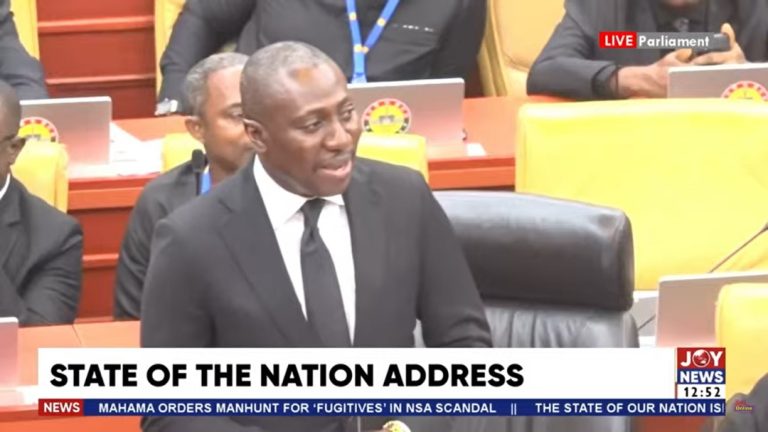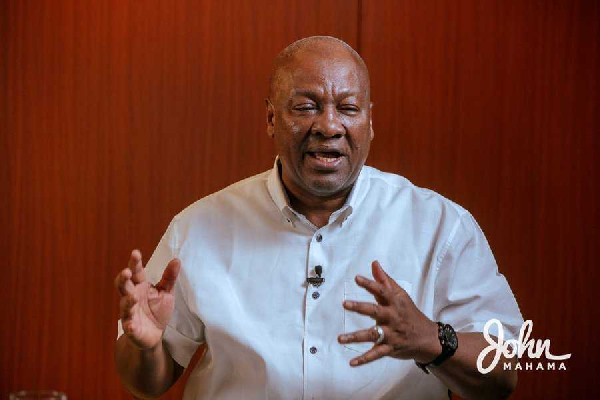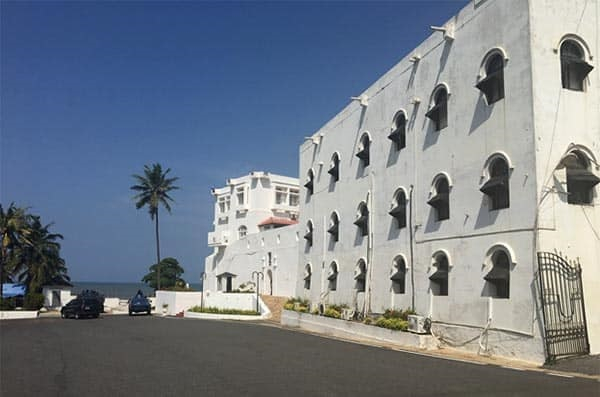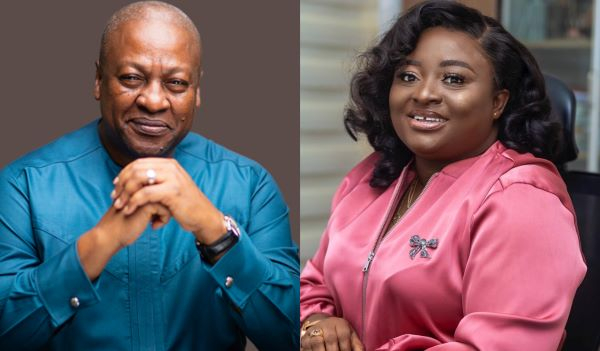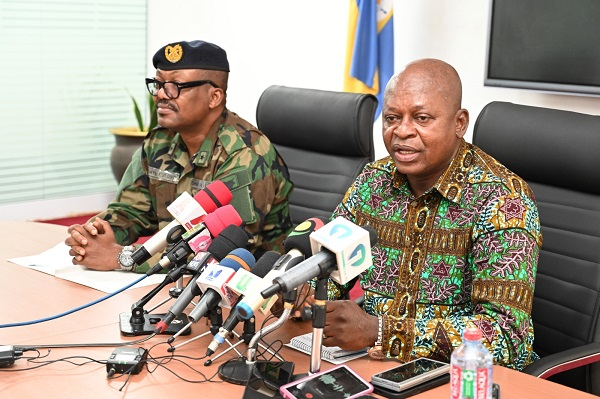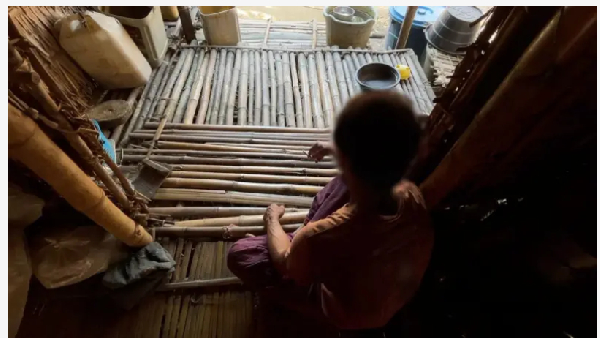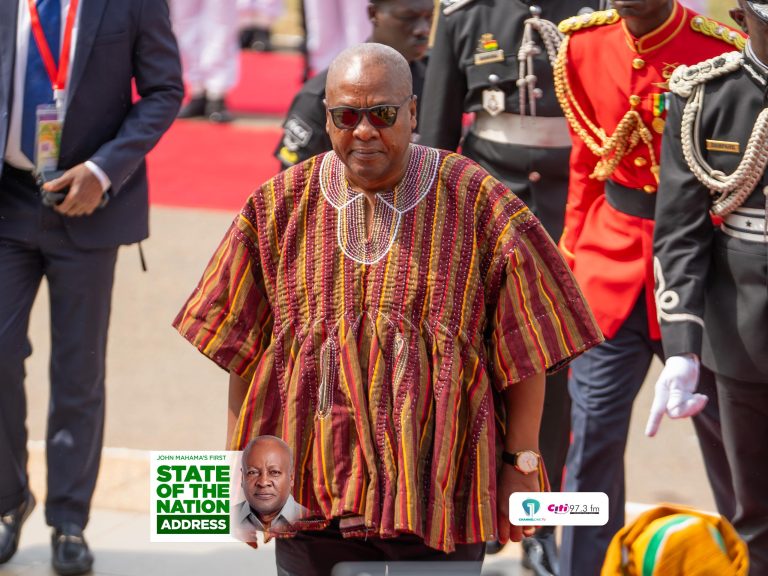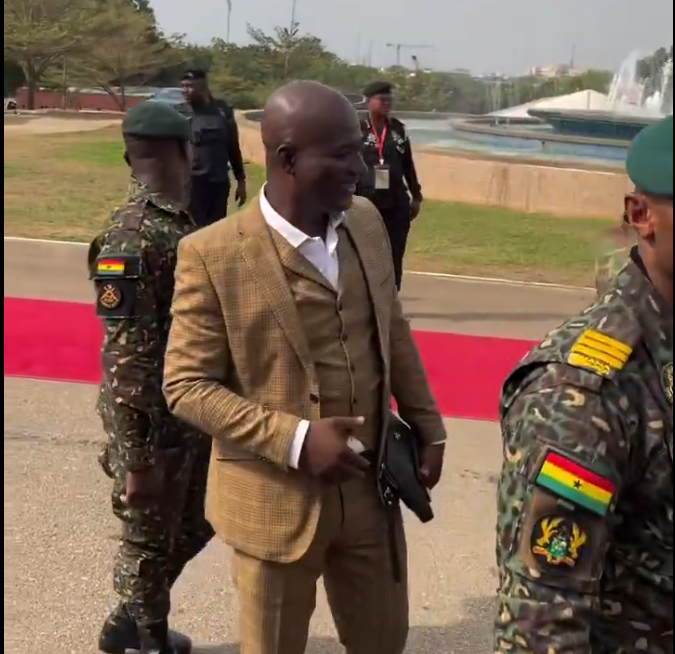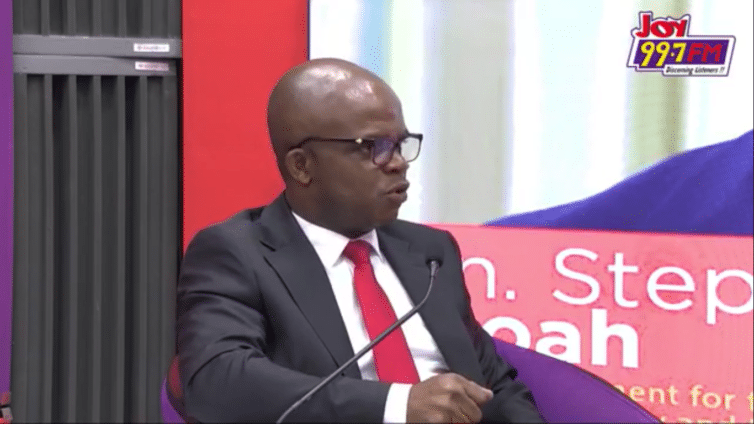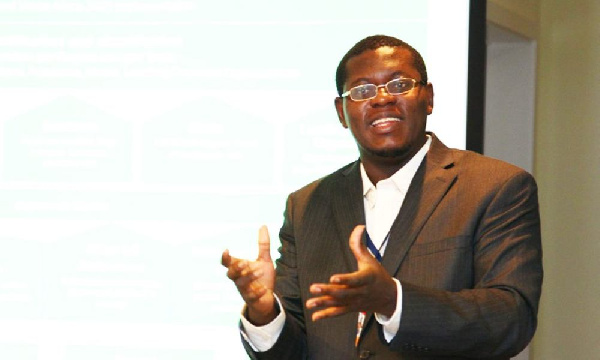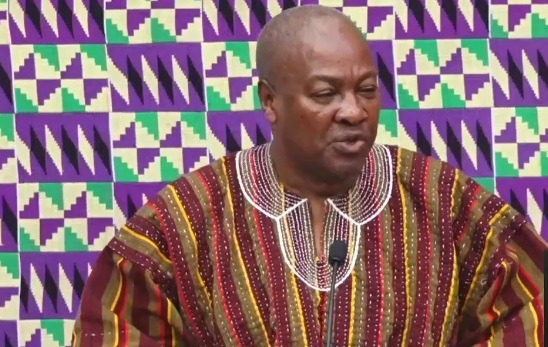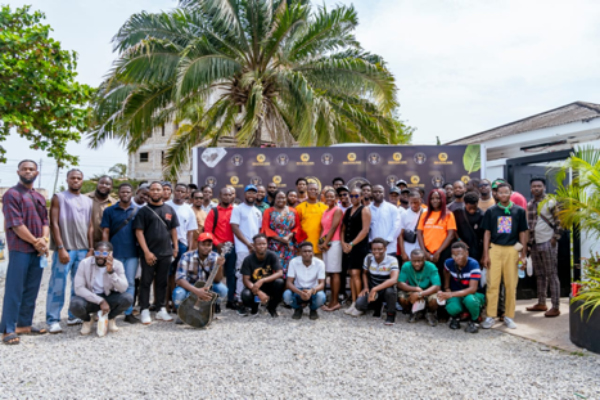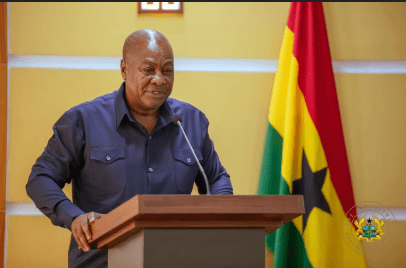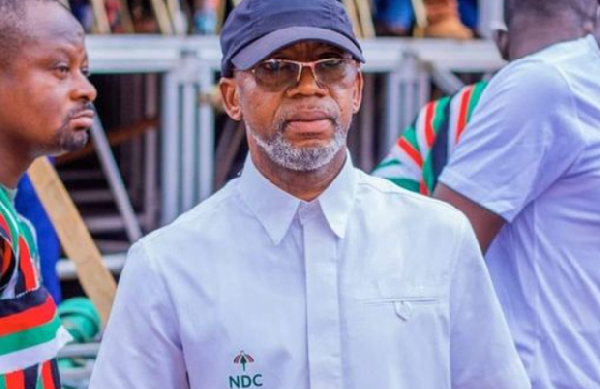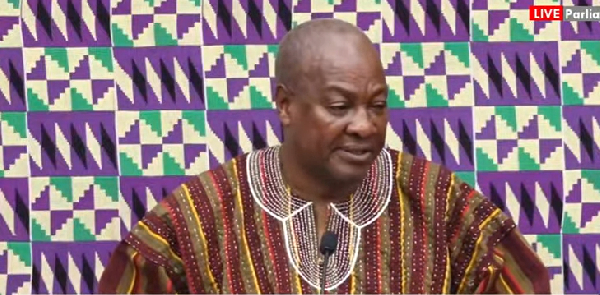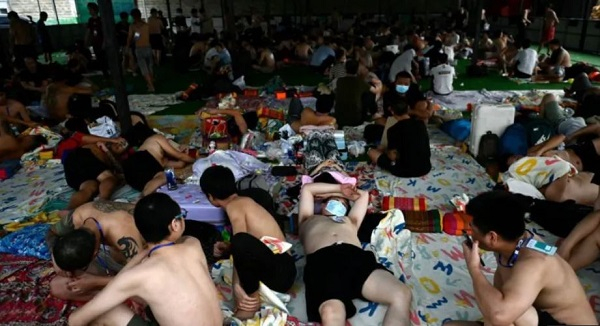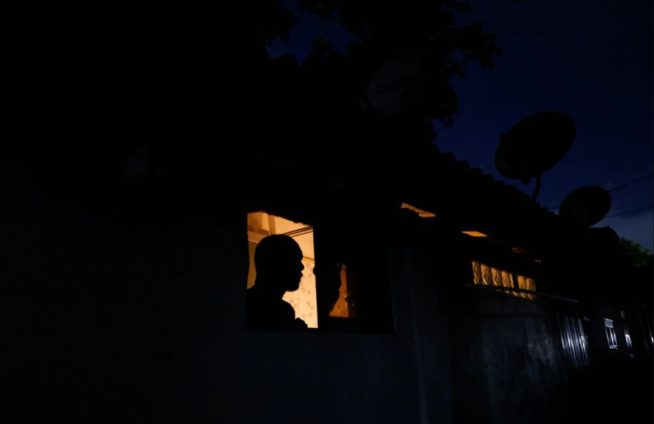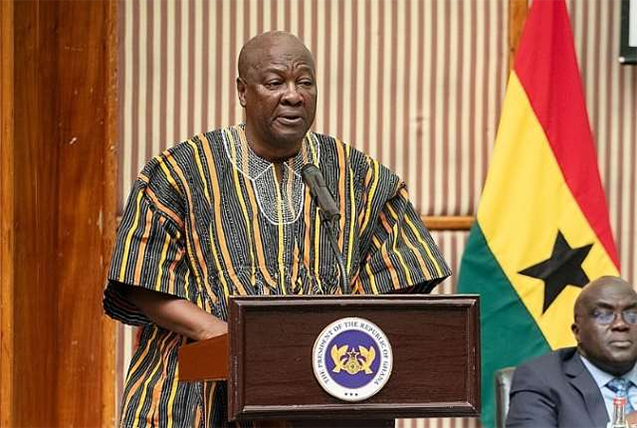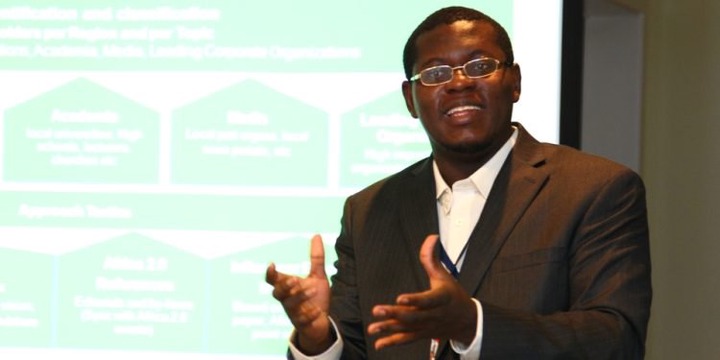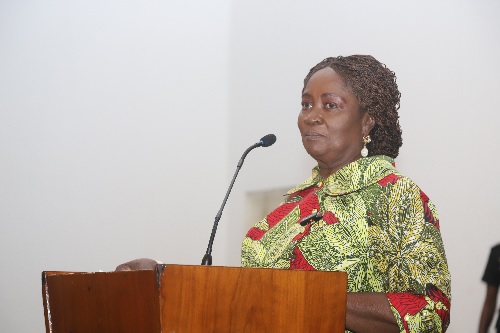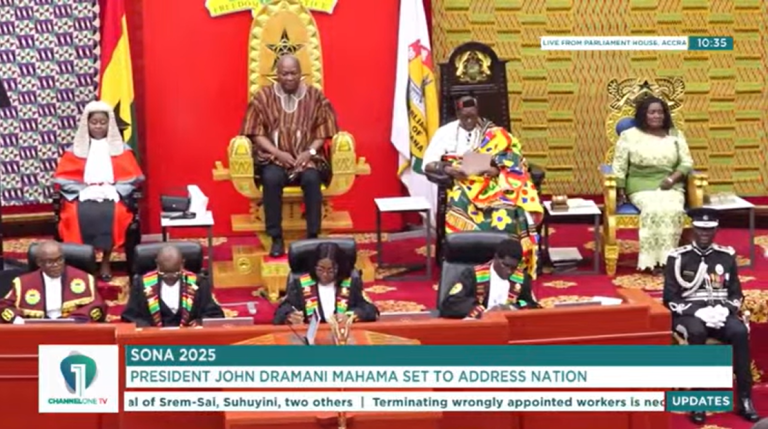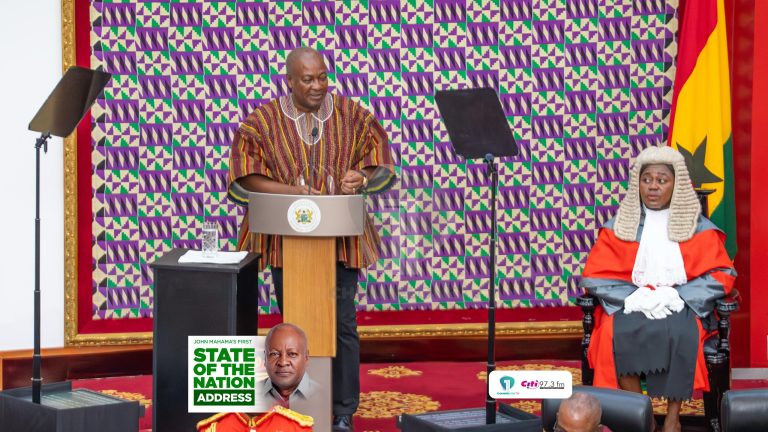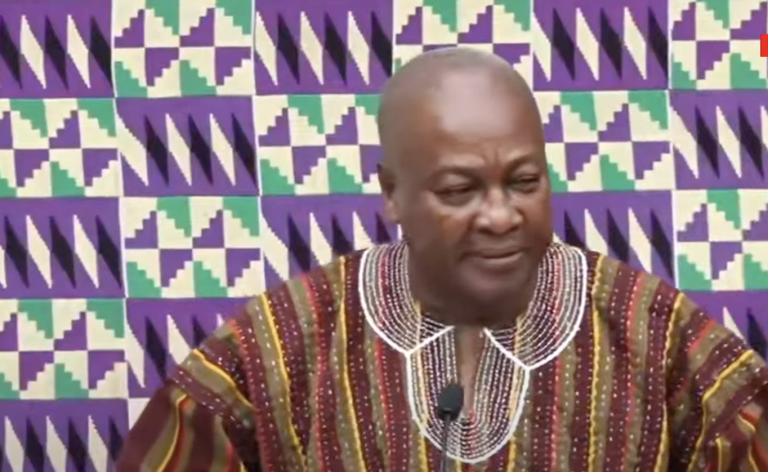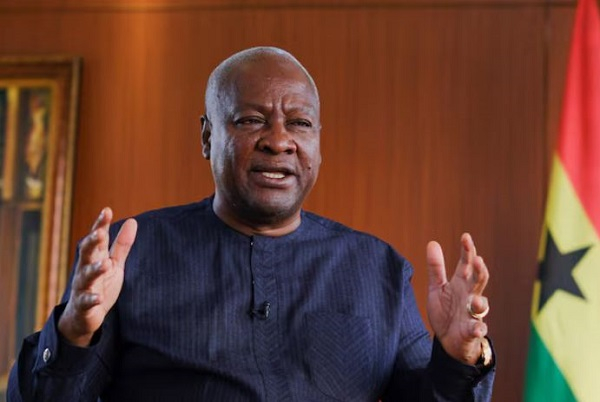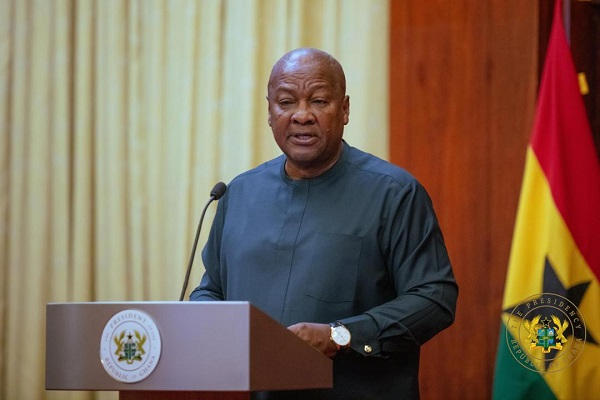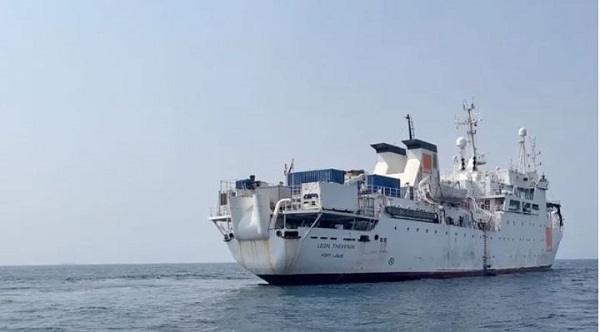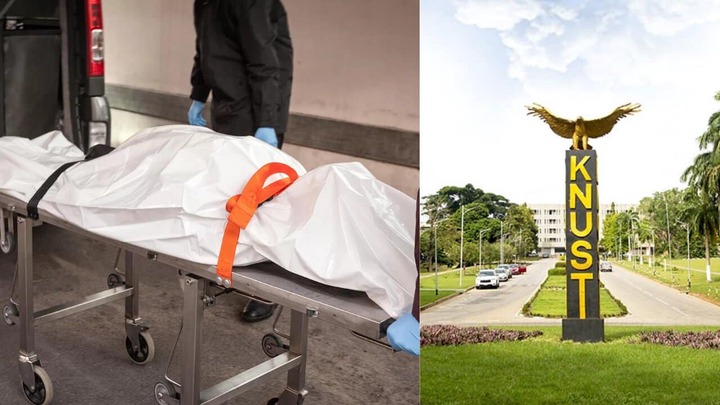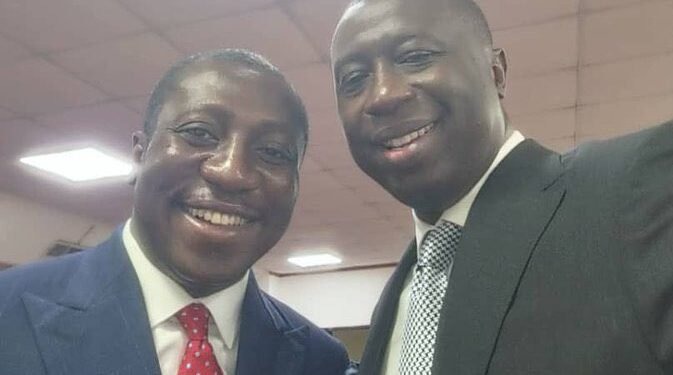The government is set to pay GH¢9.7 billion by the end of September 2025 to settle part of COCOBOD’s growing debt, President John Dramani Mahama has revealed.
Addressing Parliament during the 2025 State of the Nation Address, he detailed the financial distress facing the cocoa sector, warning that mismanagement and poor decisions in recent years have plunged COCOBOD into severe debt.
“The hope of cocoa farms is also highly indebted. Its balance sheet indicates a total debt of GH¢32.5 billion, of which GH¢9.7
Govt to pay GHC9.7bn in September to settle part of COCOBOD debt
President Mahama calls on NPP to join National Economic Dialogue
By Ernest Nutsugah
Accra, Feb 27, GNA – President John Dramani Mahama has urged members of the New Patriotic Party (NPP) to take part in the upcoming National Economic Dialogue, scheduled for March 3 and 4, 2025.
In his State of the Nation Address on Thursday, he called on the opposition not to boycott the event, recalling their decision to abstain from the Senchi Forum in 2014.
President Mahama disclosed that a planning committee had been formed for the dialogue, which aimed to address the current economic challenges and reach a consensus on key policies.
He said that the National Economic Dialogue would fulfill his 120-day social contract with the Ghanaian people and contribute to the development of a homegrown fiscal consolidation program.
The President also noted that the forum would focus on highlighting essential structural reforms and policy priorities required to reset the economy and ensure prosperity for all citizens.
“I believe there’s absolute wisdom in what our elders say two heads are better than one… consultation and consensus building have always proven to be better than unilateral decision making.
“It is my hope, therefore, that our colleagues on the other side of the divide will display love of country and participate in this national dialogue, unlike the boycotts of the Senchi Forum in 2014,” he stated.
President Mahama commended Organised Labour for their cooperation during the negotiations for the 10 percent base pay and minimum wage adjustments under the 2025 Single Spine Salary Structure.
He indicated plans to activate the 24-hour economy policy, implement the “10 billion big push policy” for swift infrastructure development, “rationalise taxes, and foster inclusive growth.”
“I’m confident that the sacrifice we have all made this year will significantly benefit our economy’s health in the future…
“We look forward to a positive economic outlook as we restore macroeconomic stability…The goal is prosperity for all, which must be shared and not the prerogative of a select few,” he added.
GNA
Afenyo-Markin timed out by Speaker for ‘prolonging’ his response to Prez Mahama’s SONA
The Speaker of Parliament, Alban Bagbin, cut short Minority Leader, Alexander Afenyo Markin’s response to President John Mahama’s State of the Nation Address (SONA) on Thursday, February 27.
Per the norm, the Majority and Minority leaders respectively are invited to pass comments on the State of the Nation Address immediately the President delivers same, to set the tone for a thorough debate later.
Soon after the Majority Leader, Mahama Ayariga had praised the President for a ‘true state’ of the nation presentation, it was the Effutu MP’s turn, and he wasted no time in painting the address as hopeless as possible, beginning with a congratulatory message to the President and acknowledging that it was the first time since he was re-elected President that he was addressing Parliament.
He then proceeded to pick apart statements the President had made, referencing comments in 2013, when John Mahama had described Ghana’s economy to be in a very bad shape, to wit, “the meat is now down to the bones” in reference to the economy.
Afenyo-Markin criticised the President for once again lamenting over the same economic challenges, despite his role in managing the economy during his previous term.
He also pointed out what he saw as a contradiction, highlighting that while the President had appointed fewer ministers, he had increased the number of presidential staffers.
Afenyo-Markin spent considerable time in tackling one issue after another, and when the Majority members began chanting “away, away”, Afenyo signalled he was not done yet.
Speaker Bagbin then intervened, telling him, “Honourable Minority Leader, you have one more minute.”
Afenyo gesticulated that it cannot be the case, lifting a finger up and wiping it from left to right.
“I cannot be limited, Mr. Speaker. Let me finish,” he said, and resumed his critique.
Before long however, the Speaker’s voice tore in again, this time with a firm “Your time is up, Honourable Minority Leader,” to end it all for Afenyo-Markin who stood protesting and seeking to continue.
The Speaker proceeded to put the question for the acceptance of the address (even as the Minority members protested by singing portions of the National Anthem to resist ‘the oppressor’s rule’) before adjourning the house.
DISCLAIMER: The Views, Comments, Opinions, Contributions and Statements made by Readers and Contributors on this platform do not necessarily represent the views or policy of Multimedia Group Limited.
$400M spent on Agenda 111, yet no hospital operational – Mahama
President John Dramani Mahama has disclosed that approximately $400 million was spent on the Agenda 111 hospital project under the previous administration without a single facility being fully operational.
The revelation came during his maiden State of the Nation Address in his second term before Parliament on Tuesday.
Agenda 111, an ambitious healthcare initiative aimed at constructing 111 hospitals nationwide, was launched to bridge the country’s healthcare infrastructure gap.
However, President Mahama’s remarks indicate that despite significant financial commitments, none of the hospitals have been completed and made operational.
“It is worth disclosing that USD400m has already been disbursed under agenda 111 project,” President Mahama said, indicating that yet not a single hospital under this gargantuan initiative is serving the people of Ghana.
President Mahama further suggested that the amount already spent could have facilitated the completion and operationalization of at least 22 of the proposed hospitals if resources had been utilized efficiently.
Culprits declared wanted, assets to be frozen – Mahama
President John Dramani Mahama has boldly directed that culprits of the National Service ghost names scandal be declared wanted and their assets frozen.
According to John Mahama some of the culprits of the NSS scandal have fled the country.
Delivering his first State of the Nation Address in his second term to Parliament on Thursday, February 27 stated, “I have directed that culprits be declared wanted and their assets frozen.
Final-year KNUST student found dead; University pledges probe
The Kwame Nkrumah University of Science and Technology (KNUST) has assured the university community and students of their safety following the tragic death of a fourth-year Biological Sciences student, Joana Deladem Yabani.
According to the institution, her lifeless body was discovered near the KNUST Disability and Rehabilitation Centre at approximately 5:00 a.m. on February 27, 2025, after the KNUST Security Services received a report on the incident.
Upon confirming her death, the university promptly transported the body to the University Health Services for further examination.
In a statement issued on Thursday, February 27, the school’s management pledged to get to the root of the matter, stating that a comprehensive investigation is underway in collaboration with the Criminal Investigations Department (CID), KNUST Internal Security, and the University Health Services to determine the circumstances surrounding the unfortunate death.
The university has also officially informed the family of the deceased and urged students to remain calm, avoid spreading unverified information, and respect the privacy of the bereaved family during this difficult time.
Management further extended its deepest condolences to the grieving family.
“We will provide further updates as the investigation unfolds,” the statement concluded.
President Mahama backs Madina MP’s 5% Minimum Employment Bill for Persons with Disabilities
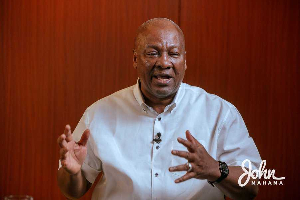 President John Dramani Mahama is Ghana’s president
President John Dramani Mahama is Ghana’s president
President John Dramani Mahama has thrown his supportbehind a proposed Private Member’s Bill seeking to mandate a minimum 5% employment quota for Persons with Disabilities (PWDs) in public and private sector institutions across Ghana.
President Mahama publicly made this endorsement of the bill during his delivery of the first State of the Nation Address (SONA) of his second term in Parliament.
Ghanaians and the international community were on Thursday, February 27, 2025, watch as President John Dramani Mahama delivered his first State of the Nation Address (SONA) in his historic second term.
“Mr. Speaker, we are committed to enhancing the legal framework surrounding disability rights by passing the Persons with Disability (Amendment) Bill. Additionally, we will introduce a Legislative Instrument to strengthen further the provisions of the Persons with Disability Act of 2006 (Act 715).
“I want to reiterate our commitment to ensuring that individuals with disabilities have access to free tertiary education and equal opportunities to pursue their academic and professional ambitions,” he said.
The president added that, “The government intends to ensure the implementation of the legislation that enjoins public and private employers to reserve 5% of their employment for persons with disabilities.”
The address, a constitutional requirement under Article 67 of the 1992 Constitution, highlighted the true state of affairs in key sectors of the economy; challenges inherited; and the government’s roadmap for recovery and transformation.
However, President Mahama’s endorsement of the bill during the first SONA signals a renewed national commitment to disability rights and inclusive governance.
As Ghana strives for equity in employment, the proposed legislation is expected to spark national debate and drive policy reforms aimed at ensuring fair job opportunities for all citizens, regardless of physical ability.
The bill, spearheaded by the Member of Parliament of Madina Constituency in the Greater Accra Region, Francis-Xavier Sosu, aims to address the long-standing discrimination and exclusion of PWDs in the job market by making their employment a legal requirement rather than an option.
Sosu, in his request to Parliament’s Legislative Drafting Office, emphasised that despite existing anti-discriminatory laws, many PWDs continue to face economic marginalization.
Sosu further highlighted that Ghana’s lack of a structured employment policy for disabled persons has worsened their socio-economic conditions.
He noted, “Our society does not seem to consider PWDs as productive components of mainstream society. It is time to change this narrative.”
Data from the Ghana Statistical Service (GSS) shows that 8% of Ghana’s population — approximately 2.4 million people — live with some form of disability, a significant rise from 3% in 2010.
However, despite their qualifications and capabilities, PWDs still struggle to secure meaningful employment.
Challenges faced by PWDs in Ghana include:
– Inaccessible workplaces and transport systems
– Lack of disability-friendly policies in companies
– Stigma and misconceptions in the job market
– Limited vocational training opportunities
– Fear among employers of legal challenges if PWD employment does not work out
Francis-Xavier Sosu cited the abrupt termination of the employment of PWDs at toll booths as a major setback, leaving many without sustainable income.
He has also criticised the inconsistent disbursement of the 2% District Assembly Common Fund (DACF) allocated to PWDs, which has further worsened their financial struggles.
The bill proposes a compulsory employment quota of 5% for PWDs in all institutions to promote inclusion and economic empowerment.
Sosu stressed that passing such a law would not only protect marginalised groups, but also contribute to Ghana’s achievement of Sustainable Development Goals (SDGs) 1, 2, 3, 4, 5, 8, and 10, which focus on poverty reduction, zero hunger, good heath and well-being, quality education, gender equality, decent work and economic growth, and reduced inequalities.
2025 SONA: COCOBOD is highly indebted, total debt stands at GH¢32.5 billion
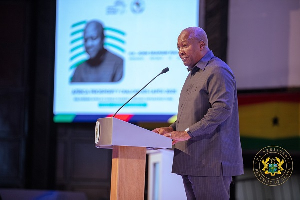 President John Dramani Mahama
President John Dramani Mahama
President John Dramani Mahama has expressed concern over the state of Ghana’s cocoa sector, citing its high debt levels as a major challenge to growth and a burden on farmers.
Delivering the State of the Nation Address on February 27, 2025, he stated, “Ghana Cocoa Board, the hope of cocoa farmers is also highly indebted. Its balance sheet indicates a total debt of GH¢32.5 billion, of which GH¢9.7 billion is due for payment by the end of September 2025.”
President Mahama blamed COCOBOD for causing financial losses to Ghanaian farmers through certain contractual agreements.
“In the 2023/2024 crop season, COCOBOD failed to supply 333,767 tonnes of cocoa, which had been sold at US$2,600 per tonne. As a result, the then management of COCOBOD rolled over these contracts into the 2024/2025 cocoa season.
“This means that for every tonne of cocoa delivered this year under these rolled-over contracts, COCOBOD and the Ghanaian farmer will lose US$4,000 in revenue.”
He further revealed that COCOBOD has so far supplied 210,000 tonnes under the rolled-over contracts, resulting in a revenue loss of US$840 million for both COCOBOD and Ghanaian farmers.
“COCOBOD and the Ghanaian farmer will lose another US$495 million when the Board completes the supply of the remaining rolled-over contracts.
Additionally, cocoa road commitments alone amount to GH¢21.7 billion, of which only GH¢4.4 billion is included in the total debt of GH¢32.5 billion,” he added.
The president further explained that much of COCOBOD’s debt stemmed from decisions made in 2019 and 2020 to award road contracts worth over US$1 billion ahead of the election.
SSD/MA
Watch the latest episode of Health Focus below
SONA 2025: I will transform Osu Castle into a tourist destination
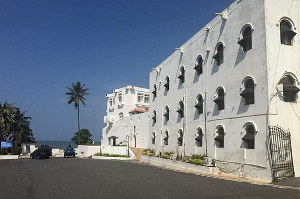 The project aims to attract both local and international visitors
The project aims to attract both local and international visitors
President John Dramani Mahama has announced plans to develop Osu Castle, the former seat of government, into a major tourist attraction.
The announcement was made during his first State of the Nation Address on February 27, 2025, as part of his administration’s broader agenda to boost Ghana’s tourism sector.
Addressing Parliament on February 27, 2025, President Mahama outlined his vision for transforming Osu Castle and its surrounding area into a vibrant tourist hub.
“We will develop Osu Castle, the former seat of government, and the area around it as a tourist attraction. It will feature a pedestrian precinct with arts and craft markets, as well as jewellery and gold markets. This approximately 22-acre site will become a prime destination for tourism,” he stated.
The project aims to create a unique cultural and commercial space that will attract both local and international visitors.
The arts and craft markets, along with the jewellery and gold markets, will provide opportunities for local artisans and entrepreneurs to showcase their products and generate income.
About Osu Castle
Osu Castle, also known as Christiansborg Castle, is a historic landmark with deep cultural and political significance.
Located in Accra, the castle and its surrounding 22-acre land served as the seat of government for several decades before being converted into a presidential museum.
Watch the livestream below:
ID/MA
Click here to follow the GhanaWeb Entertainment News WhatsApp channel
NSS Scandal: Declare runaway officials wanted and freeze their assets
 President John Mahama (L) and Gifty Oware (R) a former Deputy Exec. Director of NSS
President John Mahama (L) and Gifty Oware (R) a former Deputy Exec. Director of NSS
President John Dramani Mahama has directed state security agencies to declare officials of the National Service Authority who have fled the country after being implicated in the ghost names scandal as wanted.
He further stated that he has directed for the assets of absconded individuals to be frozen and traced as investigations continue. According to him, the theft of state and public funds is a criminal act, and he firmly believes that such criminal activities must not go unpunished.
“As part of our Operation Recover All the Loot (ORAL) policy I have already tasked our investigative bodies to bring the culprits of the National Service ghost name scandals to justice. Such brazen theft of public funds must not go unpunished. It is estimated that the criminal addition of more than 80,000 ghost names could have yielded the suspects over GH¢50 million every month.
“Unfortunately, some of these suspects are believed to have absconded from the country already and so, I have directed that they be declared wanted and their assets traced and frozen until investigations are completed,” he made this known while delivering his maiden SONA in his second term as president on the floor of Parliament on Thursday, February 27, 2025.
This follows the discovery of about 81,885 suspected ghost names on the National Service Authority’s payroll.
The ghost names were detected following a headcount of active National Service personnel, conducted at the behest of the Minister for Finance as a prerequisite for clearing allowance arrears dating back to August 2024.
The National Intelligence Bureau (NIB) detained Yaw Danso, an Accountant at the National Service Authority (NSA), in connection with the ghost names payroll scandal.
His arrest followed that of Kwaku Ohene Gyan, the former Deputy Director of Operations at NSA, who was taken into custody on February 22, 2025.
Gifty Oware-Mensah, the former Deputy Executive Director of NSA, also remains on the run as authorities intensify their search for suspects linked to the fraudulent payroll scheme.
MAG/EK
Meanwhile, watch as Nana Akomea, Kwesi Pratt clash on radio over public sector dismissals
GPHA boss calls for removal of VAT, COVID-19 levies on transit cargo
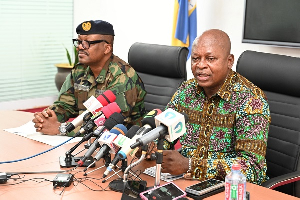 Acting Director-General of GPHA, Brigadier-General Paul Seidu Tanye-Kulono
Acting Director-General of GPHA, Brigadier-General Paul Seidu Tanye-Kulono
The Acting Director-General of the Ghana Ports and Harbours Authority (GPHA), Brigadier-General Paul Seidu Tanye-Kulono, has made a compelling case for scrapping VAT and COVID-19 levies on transit cargo.
He believes such a move would significantly enhance Ghana’s competitiveness as a premier transit hub in the West African sub-region, positioning the country to attract greater international business and strengthen its economic standing.
Brigadier-General Tanye-Kulono argued that removing VAT on transit cargo would not only make Ghana’s ports more attractive to global trade but also create substantial job opportunities, supporting the government’s ongoing efforts to stimulate economic growth and align with its 24-hour economic policy.
He made these remarks during a working visit by the Minister of Transport, Joseph Bukari Nikpe, to the GPHA headquarters.
In his address, the Director-General emphasized that the transit trade market is highly competitive, with neighboring ports such as Lomé and Abidjan constantly vying for business.
He noted that any disruption in Ghana’s port operations, particularly through the imposition of additional levies, could result in businesses shifting to alternative regional ports.
“Since the cargo in question is not destined for Ghana, it stands to reason that removing these VAT levies would not only boost business but also generate additional employment opportunities,” he stated.
Brigadier-General Tanye-Kulono further revealed that a joint team comprising personnel from the Customs Division of the Ghana Revenue Authority (GRA) and GPHA had recently traveled to Lomé to assess their port systems.
This followed a similar visit to Abidjan, where the team studied operational practices to enhance Ghana’s port competitiveness and streamline operations.
Outlining his strategic vision for the Authority, Tanye-Kulono highlighted key focus areas, including the digitalization of operations, building organizational resilience, and fostering a corporate culture rooted in discipline, fairness, and teamwork.
He expressed optimism that these initiatives, coupled with support from government agencies, would propel GPHA to new heights of operational efficiency and customer satisfaction.
The Director-General also assured that investigations were underway regarding some missing trailers and that due process would be followed. Once the investigations are concluded, all culprits will be held accountable.
In response, Minister Joseph Bukari Nikpe expressed his commitment to working closely with all relevant stakeholders to facilitate the removal of VAT and COVID-19 levies.
He emphasized that the government, under President John Dramani Mahama’s leadership, remains dedicated to revitalizing the country’s economy, with the maritime and port sectors identified as critical pillars in this strategic agenda.
Minister Nikpe also praised Brigadier-General Tanye-Kulono’s leadership and urged GPHA staff and management to rally behind him in advancing the Authority’s mission.
The Minister and his entourage visited Meridian Port Services (MPS) and the Tema Shipyard.
Discussions during these visits focused on port infrastructure expansion, improving operational efficiencies, and exploring industry reforms aimed at strengthening Ghana’s maritime sector.
Accompanying the Minister were the Chief Director of the Ministry of Transport, Mrs. Mabel Sagoe, and other senior officials from the Ministry.
The visit forms part of a broader initiative to tour agencies under the Ministry’s oversight, fostering closer collaboration and gaining a deeper understanding of strategic developments in the maritime and transport sectors.
With a focus on modernization and competitiveness, these initiatives signal a pivotal moment for Ghana’s ports as they strive to become a leading maritime gateway for the sub-region.
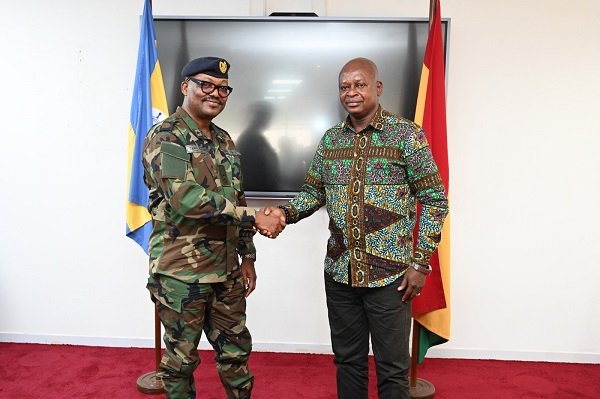
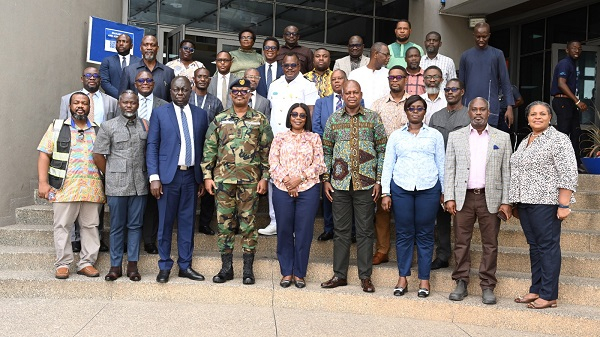
You owe Africans an apology
 Former Nigerian international John Obi Mikel
Former Nigerian international John Obi Mikel
Former Nigerian international John Obi Mikel has demanded an apology from Jamie Carragher, insisting that the Englishman offended Africans with his statement about the status of the Africa Cup of Nations.
Mikel’s demand follows Carragher’s seemingly dismissive remarks about Africa’s flagship football tournament, the Africa Cup of Nations (AFCON).
Speaking on his podcast, the former Chelsea midfielder stated that Carragher was wrong and should apologize.
“For me, that’s absolutely wrong. His statement is so wrong, and I hope he comes out to make a massive apology because he owes us. He does owe the people around the world an apology,” Mikel said.
What Carragher said about the AFCON
During the post-match analysis of Liverpool’s 2-0 win over Manchester City on February 23, 2025, on Sky Sports, Carragher asserted that although Mohamed Salah, an Egyptian, excels with Liverpool, the lack of a major tournament for his national team could hinder his chances of winning the 2025 Ballon d’Or.
“I think the problem is that he [Salah] is with Egypt, and he’s probably not playing in a major tournament or maybe doesn’t have a great chance of winning. I think it’s either the Champions League or a major tournament.
“Normally, the player who excels in that, like Vini Jr. and Mbappe right now, Real Madrid looking really good going for the Champions League. Liverpool will be in that conversation, but right now, Los Blancos are certainly the front-runners,” he said.
EE/EK
Meanwhile watch GhanaWeb’s breakdown of the uproar triggered by Jamie Carragher’s comments on the AFCON and Mo Salah below:
‘I sell my kidney to get my own house and pay my debts’
“I just want make I get my own house and pay all my debts – dat na why I decide to sell my kidney,” Zeya wey be farm worker for Myanmar tok.
Prices shoot go up afta one coup wey occur for 2021 cause civil war. Im bin find am hard to feed im young family and gbese bin full im head.
Dem bin all live for im mother-in-law house, for one village wia thatch house line up for roads wey dey few hours drive from di kontri biggest city, Yangon.
Zeya, wey we change im name to hide im identity, sabi some local pipo wey don sell one of dia kidneys. “Dem look healthy to me,” e tok. So im begin ask around.
Im follow among di eight pipo for di area wey tell BBC Burmese say dem sell one kidney by travelling to India.
Illegal organ trading na problem across Asia, and Zeya story help torchlight how e dey take happun.
Arranging di deal
Buying or selling human organs dey illegal for both Myanmar and India, but im say, im soon find one man wey im call “broker”.
Im say di man arrange medical tests and, few weeks later, tell am say dem don find one potential receiver – na Burmese woman – and say dem two fit travel go India for di surgery.
For India, if di donor and receiver no be close relatives, dem must to show say dem no dey donate am for selfish reason and explain di relationship between dem.
Zeya say di broker forge one document, wey every family for Myanmar must get, listing di details of family members.
“Di broker put my name for di receiver family tree,” im explain.
Im say di broker make am look like say im dey donate to pesin wey im dey related to by marriage – “someone wey no be blood relative, but distant relative”.
Den, im say, di broker carry am go meet di receiver for Yangon.
For dia, im say one man wey introduce imsef as doctor complete more paperwork and warn Zeya say im go pay plenty money if im say im no do again.
BBC bin contact dis man afterwards, wey say im part for di mata na to check weda or not di patient dey fit to do di procedure, not to check di relationship between donor and receiver.
Zeya say dem bin tell am say im go collect 7.5m Myanmar kyats.
Dis na somewia between $1,700 and $2,700 over di last few years – di unofficial exchange rate no stable since di coup.
Im say im fly go northern India for di operation and e happun for one big hospital.
All transplants wey involve pipo from foreign kontris for India must dey approved by one panel wey dem dey call authorisation committee, wey either di hospital or local goment establish.
Zeya say four pipo bin interview am, through one translator.
“Dem ask me if I dey willing to donate my kidney to her, not by force,” im say.
Im say e explain give dem say di recipient na relative and di transplant dey approved.
Zeya remember di doctors as dem bin dey give am anaesthetic before im lost consciousness.
“No big issues happun afta di surgery, except say I bin no fit move without pain,” im tok, come add say im stay for hospital for one week.
‘Fake mama’
Anoda donor, Myo Win – also no be im real name – tell BBC say im too bin get to pretend say im dey related to one stranger.
“Di broker give me one paper, and I get to memorise wetin dem write inside,” im tok, come add say dem tell am to say di pesin wey dey receive di kidney dey married to one of im relatives.
“Di pesin wey bin assess my case also call my mama, but di broker arrange one fake mama for di call,” im tok.
E say di pesin wey ansa di call confam say im dey donate im kidney to one relative wit her permission.
Myo Win say dem bin offer am di same amount of money as Zeya, but dem describe am as “charitable donation”, and im bin pay di broker about 10% of am.
Both men say dem bin give dem one third of di money up front.
Myo Win say dis bin dey im mind as im enta di operating theatre: “I make up my mind say I get to do am becos I don already collect dia money.”
Im add say im bin “chose dis desperate way” as im bin dey struggle wit gbese and medical bills for im wife.
Unemployment don rise for Myanmar since di coup wey make foreign investors run.
For 2017, one quarter of di population bin dey live in poverty – but by 2023, di number don rise to half, according to UN development agency, UNDP.
Myo Win say di broker no tell am say selling im kidney dey illegal. “I for no do am if to say im tell me. I dey fear to go prison,” im say.
Di BBC no go name any organisation or pipo so dat e go protect di identity, anonymity and safety of pipo wey we interview.
However, anoda man for Myanmar, wey also no want make dem call im name, tell BBC say im don help about 10 pipo buy or sell kidney through surgery for India.
Im say im bin refer pipo go one “agency” for Mandalay wey dey central Myanmar, wey im say make arrangements.
“But no worry about donors,” im tok. “We get list of donors wey dey queue up to donate dia kidneys.”
E too say dem dey fake di documents to label strangers as related by marriage.
Wen dem ask am weda im dey collect money for im help, im no ansa.
Arrests in India
Organ transplants don increase by more dan 50% worldwide since 2010, as dem dey do reach about 150,000 per year, according to World Health Organization (WHO).
But di supply of organs meet only about 10% of global need.
Trading in human body parts dey illegal for nearly all kontris and e dey hard to measure.
For 2007, WHO give estimate say 5-10% of organs wey dem transplant come from black market, but di numbers fit dey higher.
Documents dey of illegal kidney sales wey don occur in recent years sake of poverty across Asia, including Nepal, Pakistan, Indonesia, Afghanistan, India and Bangladesh.
For long time, India na centre for medical tourism and concern about selling of kidney don dey rise for dia sake of accounts for media reports and one recent police investigate.
Last July, India police say dem bin arrest seven pipo wey get connection wit one alleged kidney racket, including one India doctor and her assistant.
Police allege say di group dey arrange for poor Bangladesh pipo to sell dia kidneys, using fake documents to get approval for di transplants.
Dr Vijaya Rajakumari, wey bin dey work for di ogbonge Indraprastha Apollo Hospital for Delhi, bin allegedly do operations as visiting consultant for one different hospital, Yatharth, wey dey few kilometres away.
Her lawyer tell BBC say di allegations “dey entirely baseless and without evidence”, say she only bin dey do surgeries wey authorisation committees approve and she dey always act according to di law. According to her bail order, dem no accuse her of preparing fake documents.
Yatharth Hospital tell BBC say all im cases, including di ones wey visiting consultants dey manage, “dey subject to our strong protocols to make sure say dem comply wit legal and ethical standards”.
“We don further improve our processes to prevent dat kain tin from happening for future,” di hospital tok.
Afta her arrest, Apollo Hospitals say Dr Rajakumari na freelance consultant wey dey work on fee-for-service basis and e don end all clinical engagements wit her.
Dem never carry Dr Rajakumari go court.
‘No regrets’
Last April, one senior health ministry official write to Indian states warning of “rise” in transplants wey involve foreigners and call for better monitoring.
Under Indian law, foreigner wey wish to donate or receive organs must get dia documents, including di ones wey show di relationship between donor and recipient, and dia own kontri embassy for India go verify am.
Di BBC contact India heath ministry and di National Organ and Tissue Transplant Organization, as well as Myanmar military goment for comment, but no receive response.
One public health campaigner for Myanmar, Dr Thurein Hlaing Win, say: “Law enforcement no dey effective.”
Im add say potential donors need to dey aware of di risks, including of bleeding during surgery and damage to oda organs, adding say dem also need proper follow-up.
Di last time wey BBC bin hear from Zeya na several months afta im surgery.
“I bin dey able to settle my debts and buy one plot of land,” im tok.
But im say im bin no fit afford to build house and no fit construct one as im bin dey recover from di surgery.
E say im bin dey suffer from back pain.
“I have to restart work soon. If di side effects strike again, I get to deal with am. I no get regrets about am,” im add.
E say im bin dey in touch wit di receiver for some time, and she tell am say she dey in good health wit im kidney.
Speaking on condition of anonymity, she tell BBC say she pay 100m kyats (between around $22,000 and $35,000 in recent years) in total.
She deny say dem forge documents, maintaining say Zeya na her relative.
Six months afta im surgery, Myo Win tell BBC say im pay off im debts, but not all.
“I no get work and one penny no remain,” im say, come add say im dey experience some stomach problems since di surgery.
E say im no get regrets, but den e come add say: “I dey tell oda pipo make dem no do am. E no good.”
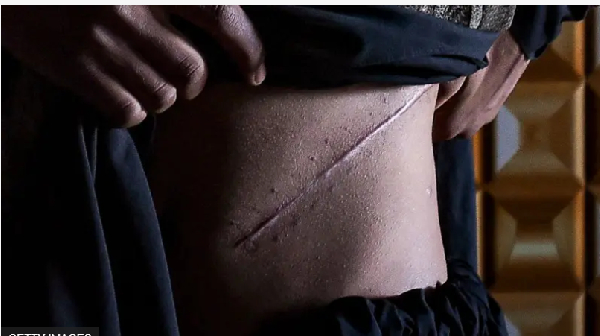
Poor pipo selling dia kidney – like dis man for Afghanistan – dey documented for many Asian kontris
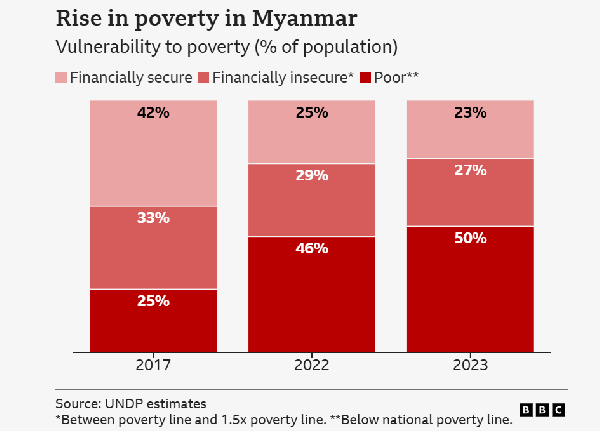
Di supply of donated organs dey meet only about 10% of di world demand, according to WHO
Ghanaian Lady Who Scored Grade 45 in BECE and 35 in WASSCE Earns Two First-Class Degrees at University of Ghana
In a remarkable tale of resilience and determination, Sophia Manu, a 25-year-old Ghanaian woman, has captured the hearts of many with her inspiring academic journey. Her story is a testament to the adage that hard work truly pays off, proving that one’s beginnings do not dictate their future.
Sophia’s educational path began like many others, filled with challenges and setbacks. During her Basic Education Certificate Examination (BECE), she scored a modest 45. While this score may not have set the stage for academic accolades, it did little to deter Sophia’s ambition. Instead, it ignited a fire within her to strive for excellence.
Transitioning to the Senior Secondary School level, Sophia faced the daunting West African Senior School Certificate Examination (WASSCE) where she achieved an even lower score of 35. In a society where academic performance is often viewed as a measure of potential, such results could have easily led to discouragement. Yet, Sophia embraced these hurdles as opportunities for growth, refusing to let them define her future.
With an unyielding spirit, she enrolled at the University of Ghana, where her dedication and tenacity began to shine. Sophia immersed herself in her studies, demonstrating an unparalleled commitment to her education. She sought help from professors, formed study groups with peers, and utilized every resource available to her. Slowly but surely, her hard work began to pay off.
After years of relentless effort, Sophia graduated with not one, but two first-class degrees—one in Psychology and the other in Business Administration. Her academic prowess is a reflection of her perseverance and an inspiring reminder that it is not where one starts but where one chooses to go. Sophia’s achievement has made waves in academic circles, and her story has become a beacon of hope for young students across Ghana and beyond.
The news of her double first-class degrees has inspired countless individuals, particularly those who may feel that they have failed due to poor initial results. Sophia’s story serves as a compelling reminder that determination, resilience, and hard work can reshape one’s destiny. “Education is not just about grades; it’s about growth,” she often says, highlighting her belief that learning is a continuous journey.
Sophia is now keen on giving back to her community. She plans to launch mentorship programs for youths in underprivileged areas, ensuring they have the support and resources to navigate their own.
Source
Madina NDC Applauds Kenzo’s Appointment as VRA CEO, Hails Mahama for Prioritizing Competence
The National Democratic Congress (NDC) in the Madina Constituency has warmly congratulated Mr. Edward Ekow Obeng Kenzo on his appointment as the Acting Chief Executive Officer of the Volta River Authority (VRA), while commending former President John Dramani Mahama for his commitment to placing competent and experienced individuals at the helm of critical national institutions.
In a statement issued by the constituency executives, the Madina NDC described Mr. Kenzo as a dedicated and results-driven professional whose extensive experience in the energy sector makes him the ideal candidate to lead the VRA toward greater efficiency and sustainability. The statement, jointly signed by Hon. Ibrahim Fuseini Faila, Constituency Chairman, and Hon. Lawyer Francis-Xavier Sosu, Member of Parliament for Madina, highlighted Kenzo’s unwavering commitment to the NDC, noting that he has been a key financier and loyal supporter of the party.
“This significant achievement is a testament to your dedication, competence, and vision,” the statement read. “We are confident that you will lead the VRA with the utmost commitment and excellence.” The Madina NDC leadership assured Mr. Kenzo of their full support as he takes on this pivotal role, emphasizing their collective commitment to ensuring his success for the benefit of the VRA and the nation at large.
The statement also praised former President Mahama for his discerning leadership, noting that his decision to appoint Mr. Kenzo reflects a deep understanding of the importance of competence and experience in governance. “President Mahama has proven once again that leadership is about putting the right people in the right positions. By appointing a technocrat and a staunch party financier like Mr. Kenzo, he has reaffirmed his dedication to good governance and the progress of our great party,” the statement added.
The Madina NDC expressed optimism that under Mr. Kenzo’s leadership, the VRA will implement transformative policies to enhance power generation, improve operational efficiency, and ensure a stable energy supply for industries and households across Ghana. They also highlighted the broader implications of the appointment, noting that it aligns with the NDC’s vision of economic growth and national development.
“We are proud to see one of our own, a true party man and a loyal supporter of the NDC, being recognized for his hard work and dedication. Mr. Kenzo has not only contributed significantly to the energy sector but has also been a pillar of financial support for the party over the years. His appointment is well deserved,” the statement read.
The Madina NDC’s endorsement of Mr. Kenzo’s appointment underscores the party’s confidence in his ability to deliver results and drive progress in Ghana’s energy sector. As the VRA embarks on this new chapter under his leadership, the NDC in Madina remains optimistic that his tenure will strengthen the authority’s capacity to meet the nation’s energy needs while advancing the party’s broader development agenda.
For the NDC, Mr. Kenzo’s appointment is not just a win for the energy sector but also a reaffirmation of the party’s commitment to excellence, competence, and loyalty in governance. As the nation watches, the Madina NDC believes that Mr. Kenzo’s leadership will be a shining example of what can be achieved when the right people are entrusted with the responsibility of driving national progress.
Mahama’s full State of the Nation Address
President John Dramani today addressed the nation on its state, promising to reset and drive it in the positive.
Among other things he promised to keep paying bondholders and not cancel the teacher trainee allowances. He also pledged to hold accountable all those who have faulted and restore fiscal discipline.
Below is his full speech
MESSAGE ON THE STATE OF THE NATION
DELIVERED BY HE JOHN DRAMANI MAHAMA, PRESIDENT OF THE REPUBLIC OF GHANA TO THE 9TH PARLIAMENT ON THURSDAY, FEBRUARY 27, 2025.
Right Honourable Speaker,
Your Excellency, the Vice President,
Your Excellency, the First Lady,
Your Ladyship, the Chief Justice,
Honourable Members of Parliament,
Honourable Members of the Judiciary,
Distinguished Leaders of Our Security Forces,
Excellences, Members of the Diplomatic Corps,
Our revered Niimei, Naamei, Chiefs, Traditional Rulers and Religious Leaders,
The National Chairman and executives of the National Democratic Congress,
The good people of Ghana,
I wish you a very good morning.
Mr. Speaker, Article 67 of the 1992 Constitution requires the President to address the people of Ghana, in whom sovereignty resides, on the state of the nation.
About thirty (30) years ago, in 1996, I took my first steps in public service when I was elected to this august house as the Member of Parliament for the Bole Bamboi Constituency.
For twelve memorable years, I forged many enduring friendships and alliances while working with colleagues from both sides of the house to shape Ghana’s legislative agenda and advance the development of our beloved country, Ghana.
It has also been nearly a decade since I said goodbye to this house after delivering what many, including myself, thought at the time would be my final address to Parliament.
God almighty, providence and the unpredictability of life have summoned me here once again, on the back of a historic electoral mandate from the people of Ghana, to deliver a message on the State of the Nation.
That mandate came with an unprecedented majority in Parliament, and here I am, once again, to deliver a message on the real State of the Nation.
Mr. Speaker, I wish to convey my heartfelt gratitude to Parliament for the prompt vetting and approval of my nominees for Ministerial positions.
This efficiency is unmatched in the history of the Fourth Republic, demonstrating the strides we can make when we come together in our dedication to serve the people of our great country.
I believe that a similar dispatch will be applied to the approval processes for my Deputy Ministerial nominees. This will enable them to promptly assume office and assist their Ministers in delivering on our noble vision of Resetting Ghana.
In making the nominations and considering the numbers involved, I considered the long-expressed sentiments of the Ghanaian people about the sheer size of previous administrations and the associated cost implications.
I trust that this significant reduction to sixty (60) Ministers and Deputy Ministers, including Regional Ministers—will set the stage for further reductions in the size of future governments.
With the inauguration of the Council of State, we can begin appointing staff for the Presidency. I intend to significantly reduce the number of staff compared to what existed under the previous administration. All this is aimed at leading by example in cutting down government expenditures and reducing the budget deficit.
Let me begin, Mr. Speaker, by invoking the timeless words of hymnist John Oatman Jr., who encourages us to count our blessings and name them one by one.
Yes, we are a nation troubled on many fronts, but we have many blessings, among which is a now firmly established democracy that, for all its imperfections, has enabled four (4) peaceful transfers of power in our land.
Nestled in a sub-region often plagued by strife and political instability, there is good reason to take sober satisfaction that these successive peaceful power transfers have become routine.
Mr. Speaker, fifty days ago, I took the solemn oath to assume leadership of this country and serve with truth and humility. This was preceded a month earlier by watershed elections that promised to revive our nation’s fortunes and give us a new lease on life.
The election result gave us an important opportunity to change course and move off the slippery slopes our country had been descending on that had caused so much economic pain, suffering, and grief.
In their collective wisdom and with resounding clarity, the Ghanaian people chose to chart a new path to reset the country’s economy. Through their votes, they made it clear that they would henceforth demand the highest standards of governance from those they put in positions of leadership.
The good people of Ghana elected me to office, with a historic electoral margin of nearly 1.7 million votes separating me from my next opponent.
For the National Democratic Congress (NDC), that resounding victory is a selfless call to duty from a people weary of years of economic hardships and poor governance.
That call, therefore, places an obligation on me and all who serve with me, including legislators from both sides of the house, to do our utmost with decency and humility to change the circumstances and state of our country.
Mr. Speaker, as I stated earlier, Article 67 of the 1992 Constitution requires that I give an account of the State of our Nation to Parliament. I am sad to report that the state of our nation is not good. Our economy is in crisis, and our people are suffering unprecedented hardships.
Mr. Speaker, we will host a National Economic Dialogue on March 3rd and 4th. On March 11th, the Minister for Finance, on my behalf, will present the budget estimates for the financial year to this August House. These two events will allow us to present the real state of Ghana’s economic crisis to the people.
Mr. Speaker, it is not my style to lament and shift blame when confronted with challenges, as others often do. My approach is to accept challenges and work hard to resolve them. Indeed, that is precisely what the people of Ghana elected me to do.
I have not come here to lament the state of our country, though there is much to lament. I understand why I was elected with such high voter confidence—to solve their problems.
With your permission, Mr Speaker, and within the constraints of time—I will take the liberty to elaborate on how we intend to address the problems.
Yesterday, February 26, 2025, marked exactly ten years since I stood in this chamber, at this very spot, to declare my determination to fix Dumsor, a legacy problem of power shortages. And I fixed it!
Yes, I promised to fix it, and I did! I wish to place firmly on record that from January 2016 until I handed over the administration of this country on January 7, 2017, there was no power rationing or load management in Ghana.
Mr. Speaker, today, inspired by the almighty God and propelled by the massive mandate given me by the good people of Ghana, I am moved to make a similar purposeful and bold declaration. That, I, John Dramani Mahama, will fix the economic crisis confronting our country and reset it on a path of growth and prosperity.
My government, working with you and every Ghanaian, will solve the challenges because we have developed a plan with our people’s support.
When I decided to run for President again, I did so because of what I knew about the state of our country. I was aware that huge problems awaited me upon my assumption of office. But nothing could prepare anyone for the reality of the depths to which our economy and governance have sunk.
Our elders say that a frog’s true length can be ascertained only after it has died. And how right they are.
It is common knowledge that our economy is in dire straits, which is putting it mildly because, after an initial assessment of the books, we have discovered that our economic problems are much deeper than was publicly known. We have inherited a country that is broken on many fronts. The profundities of the challenges are staggering.
We are saddled with staggering debts and glaring signs of almost deliberate and, in some cases, criminal mismanagement of our resources.
Mr. Speaker, not even the restraints of an IMF programme were enough for the previous economic managers to exercise prudence in managing our finances.
After setting an inflation target of 18% by the end of 2024, the actual rate was 23.8%, significantly exceeding the IMF threshold. The Ghana cedi continued its downward slide, losing 19% of its value against the dollar in 2024. It had already lost 27.8% in value in 2023.
In addition to the public debt, which amounts to a staggering GHS 721 billion, several State-Owned Enterprises are also in debt, including ECG, which owes GHS 68 billion.
Ghana Cocoa Board—the hope of cocoa farmers—is also highly indebted. Its balance sheet indicates a total debt of GHS 32.5 billion, of which GHS 9.7 billion is due to be paid at the end of September 2025.
In the 2023/2024 crop season, COCOBOD could not supply three hundred and thirty-three thousand seven hundred and sixty-seven (333,767) tonnes of cocoa, which it sold at US$ 2,600 per tonne. As a result, the then management of COCOBOD rolled over these contracts into the 2024/2025 cocoa season.
This implies that for every tonne of cocoa delivered this year in fulfilment of the rolled-over contracts, COCOBOD and the Ghanaian farmer would lose US$ 4,000 in revenue.
Mr. Speaker, as I address this honourable house, COCOBOD has supplied 210,000 tonnes out of the rolled-over contract, resulting in a revenue loss of US$ 840 million for both COCOBOD and the Ghanaian farmer.
COCOBOD and the Ghanaian farmer will lose another US$495 million when the Board finishes supplying the remaining rolled-over contracts.
Additionally, cocoa road commitments alone total GHS 21.7 billion, of which only GHS 4.4 billion is included in the total debt of GHS 32.5 billion. This debt has arisen mainly because of the decision in 2019 and 2020 to award road contracts worth over US$1 billion because of the election.
Mr. Speaker, the energy sector faces significant financing challenges primarily due to collection and system losses, non-compliance with the Cash Waterfall Mechanism, and legacy debts.
The financing shortfall has risen considerably to approximately US$2.2 billion or GHS 34 billion for 2025, and urgent measures will be needed to reduce it to sustainable levels and ultimately eliminate it.
The financial sector continues to struggle despite the previous government reportedly spending GHS 29.9 billion on the financial sector clean-up exercise to date.
They also left scant reserves for debt servicing despite implementing what may be considered the most severe and distressing economic policy in the annals of the Fourth Republic, if not in the entirety of our nation’s history—the Domestic Debt Exchange Programme.
This is in stark contrast to our actions in 2017, before we left office, when we allocated US$ 250 million to the Sinking Fund to service debt.
While there have been claims that buffers were left for debt repayment, the statement of accounts for the Debt Service Reserve Account, also known as the Sinking Fund, shows a balance of only $64,000 and GHS 143 million in the dollar and Ghana cedi accounts, respectively.
The repercussions of reckless debt accumulation and economic mismanagement will require extensive work and sacrifice to repair.
In the next four years, debt servicing will amount to GHS 280 billion, comprising GHS 150 billion for domestic and GHS 130 billion in external debt servicing.
The catastrophic debt position has also severely impacted infrastructure projects that should have been completed. There are fifty-five (55) stalled projects due to the default of debt and subsequent restructuring, with a total amount of US$ 2.95 billion not disbursed. The stalling of these projects is expected to result in a cost overrun of about GHS 15 billion.
Notwithstanding this gloomy background, I remain committed to leading this government, taking every necessary step to reset our economy, getting things back on track, and working with the good people of our country to build the Ghana we want.
We are doubling our efforts to complete all outstanding structural reforms. Through the budget, we will implement corrective measures to restore fiscal discipline and debt sustainability. We are also working towards completing the upcoming fourth review of the IMF-supported Programme.
The review is scheduled from April 2nd to April 15th, 2025, and the IMF Executive Board is expected to approve it in June 2025. As we have done previously, we are also building buffers in the Sinking Fund and adopting prudent debt management practices to ensure prompt repayment of upcoming domestic and external debt maturities.
In this respect, the government successfully honoured the matured coupon payment of GHS 6.081 billion (in cash) and GHS 3.46 billion (in kind) due in February 2025 to all Domestic Debt Exchange Programme (DDEP) bondholders.
We have also built additional buffers in the Sinking Fund to honour maturing DDEP bonds due in July and August.
With the transparent and prudent measures we have implemented since taking over the administration of this country, I urge my countrymen and women, business owners, and foreign investors to trust our competence in turning our economic fortunes around.
Mr. Speaker, since we took office on January 7, 2025, we have upheld our commitment to a fiscal consolidation agenda with a streamlined government. We have eliminated unnecessary expenditures and reduced our reliance on borrowing.
Our prudent debt management practices have led to a substantial reduction in interest rates.
The 91-day treasury bill rate, which was 28.51% on January 6, 2025, has decreased to 24.48% as of February 24, 2025. Similarly, the 182-day Treasury bill rate, which was 29.07% as of January 6, 2025, has decreased to 25.388%
The 364-day Treasury bill rate has also moved from 30.41% to 27.30% in the same period.
We signed a Memorandum of Understanding (MoU) with our Official Creditor Committee (OCC) to formalise the debt treatment agreed upon with official creditors. This marks a crucial step toward Ghana’s restoration of long-term debt sustainability. The agreement will enable financial resources to support and strengthen economic recovery.
Mr Speaker, on February 20, 2025, the National Tripartite Committee (NTC) and the Public Services Joint Standing Negotiating Committee (PSJSNC) concluded negotiations on the 2025 minimum wage and base pay for the Single Spine Salary Structure (SSS), respectively.
I want to use this opportunity to reiterate my sincere gratitude to Organised Labour and the Ghana Employers Association for their understanding and cooperation in reaching this agreement on the minimum wage and base pay.
On the final day of negotiations, I enjoyed the privilege of joining my comrades, the leaders of organised labour, for the concluding discussions. I am confident that the sacrifice we all have to make this year will significantly benefit our economy’s health.
We look forward to a positive economic outlook as we restore macroeconomic stability, encourage exports, activate the 24-Hour Economy initiative, implement the US$ 10 billion ‘Big Push’ policy for swift infrastructure development, ationalize taxes, and foster inclusive growth.
The goal is prosperity for all, which must be shared, not the prerogative of a select few.
Mr Speaker, in fulfilment of our 120-day social contract with the Ghanaian people, we have put in place the planning committee to host the National Economic Dialogue. This dialogue is expected to discuss the State of the economy and reach a consensus on the key policies needed to address the devastating economic crisis confronting us.
It will support the development of a home-grown fiscal consolidation programme and highlight key structural reforms and policy priorities essential for resetting the economy and creating prosperity for all.
I believe there is absolute wisdom in what our elders say: that two heads are better than one. Consultation and consensus building have always proven to be better than unilateral decision making. It is my hope that our colleagues on the other side of the divide will display love of country and participate in this National dialogue unlike their boycott of the Senchi Forum in 2014.
I humbly choose a different path of accommodation and cooperation with all stakeholders. We will continuously engage on important issues so that together, we can reset our country and focus on sustainable development. Together, we shall build the Ghana we want.
Mr. Speaker, my administration inherited an energy sector on the brink of collapse, which was weighed down by unsustainable debts. This unfortunate situation has led to many Independent Power Producers (IPPs) and fuel suppliers threatening to cease their operations.
Despite collecting over GHS 45 billion in Energy Sector Levies (ESLA) over the last eight years, the outgone NPP administration has left the Ghanaian people an energy sector burdened with a staggering GHS 70 billion debt as of December 2024.
It is of deep concern that several state-owned enterprises (SOEs) in the energy sector are struggling to stay afloat. Unless urgent interventions are made, many of them will go under.
Financial distress in the energy sector remains a significant obstacle to delivering consistent and affordable electricity to Ghanaians and poses an existential threat to the economy in general.
Compounding these challenges, critical maintenance activities—such as the scheduled pigging of the West African Gas Pipeline (WAPCO)—were postponed from 2024 to 2025 without sufficient contingency measures for alternative fuel supply.
As a result, my administration has had to swiftly mobilise resources to secure emergency fuel supplies, ensuring that electricity generation continues despite the difficult circumstances.
I have been informed that the pigging exercise will be completed in the first weeks of March. Once additional gas flows from Nigeria, we anticipate a marked improvement in the power situation.
While the current state of the energy sector poses grave concerns, we must remain resolute in our commitment to restoring stability. I have directed the Minister for Energy and Green Transitions to implement far-reaching reforms, including enforcing a single revenue collection account, strictly adhering to the Cash Waterfall Mechanism (CWM), and eliminating wasteful expenditures.
The Minister, following my directive has set up an advisory committee to guide the participation of the private sector in metering and billing in order to improve efficiency in revenue collection and reduce the high commercial and technical losses that are threatening to drown the state-owned utility company.
A pilot partnership between ECG and Enclave power has proved highly successful and provides us with a workable framework. ECG provides bulk supply of power to Enclave Power Limited. Enclave Power provides meters and bills all companies operating in the Free Zones Enclave with 99% revenue collection and nearly 100% uptime in power supply.
Reduction in commercial and technical losses will lead to affordable tariffs for everyone and bring relief to all users of electric power. We also aim in the medium term to achieve 100% gas utilisation for power production and eliminate the use of crude oil.
This will save Ghana hundreds of millions of dollars spent on the importation of fuel oils for power production.
With regards to renewable energy, this administration will soon operationalise a Renewable Energy and Green Transition Fund to enhance efficiency and accelerate Ghana’s transition to renewable energy.
This initiative will drive investment in sustainable energy solutions, including solar street lighting, rooftop solar installations, off-grid solar systems, electric vehicle charging stations, and chargeable outboard motors. These measures will reduce dependence on the national grid and position Ghana as a leader in Africa’s green energy transition.
Mr. Speaker, Ghana’s petroleum sector has witnessed a precipitous decline, with crude oil production shrinking by more than 32%. This has resulted from high opacity levels, a hostile business climate, and excessive political interference, culminating in most major oil companies exiting and stalling upstream activities.
The decline in upstream activity is obvious to any person familiar with the twin cities of Sekondi-Takoradi. Just under a decade ago, the twin cities were the bustling epicentre of fabrication, logistics, and service activity associated with the upstream oil and gas sector. Unfortunately, my recent visit reveals many shut down facilities and many businesses that have packed and left.
Hundreds of workers have been laid off and left unemployed. I wish to assure the people of Sekondi-Takoradi and indeed the whole Western Region that we will breathe life back into the area.
We have commenced revitalisation of our upstream petroleum sector by creating a business-friendly and congenial environment for our partners and other prospective investors. My meetings with players in the upstream sector has been extremely positive and we have been assured of substantial investments running into billions of dollars in the very near future.
Mr Speaker, Ghana has fertile lands, abundant water, and human resources. Yet, we face a paradox. Our food import bill continues to soar, reaching alarming levels of over US$2 billion annually. In addition, rising food inflation is burdening households and threatening livelihoods.
To address this, we are implementing several well-considered policies to grow the agricultural sector, including agro-processing. This will be backed by a reliable power supply, to meet our country’s needs while advancing exports to earn foreign exchange and strengthen our economy.
The Agriculture for Economic Transformation Agenda (AETA) will modernise agriculture, enhance agribusiness, ensure food security, lower food inflation, boost exports, and create sustainable jobs.
The Feed Ghana Programme will increase food production and reduce prices through projects like the Grains Development Project, focusing on rice, maize, and soybean production. The Vegetable Development Project will target crops such as tomatoes, onion, and pepper.
Our poultry farm-to-table project will eliminate poultry imports and increase local production. Ghana imports 95% of its poultry needs, which costs over US$ 300 million annually. To reverse this trend, government’s plan is to revamp the poultry sector by investing in hatcheries, feed mills, processing, and distribution, working toward eliminating poultry imports.
The Nkoko nkitinkiti project will cover fifty-five thousand (55,000) households producing eggs and fresh poultry for the market and help reduce the $300 million dollars we spend on importing chicken annually.
To strengthen the connection between agriculture and industry, we will prioritise value addition, processing, and distribution. This will position agriculture as a profitable and appealing activity, making it more attractive to young people.
We will implement an AgriNext Programme to facilitate access to land banks by young farmers, connect graduates with opportunities in the agricultural value chain, and promote greenhouse agriculture among the youth. This initiative will benefit approximately 30,000 young people.
Mr Speaker, the Livestock Development Project will address Ghana’s reliance on imported meat by restocking breeder farms and increasing local livestock production, creating jobs and boosting self-sufficiency.
For years, access to mechanisation, quality seeds, fertilisers, and extension services has been a major challenge for farmers. To address this, government will establish Farmer Service Centres in every agricultural district, ensuring farmers receive essential resources to improve productivity and efficiency.
In the fisheries sector, we will implement strategic interventions to enhance productivity and sustainability. Key among these initiatives is the continued enforcement of measures to curb illegal, unreported, and unregulated (IUU) fishing, which threatens marine biodiversity and the livelihoods of our hardworking fisherfolk.
We have intensified surveillance and monitoring operations, bolstered by the deployment of modern technology and strengthened collaboration with key stakeholders.
In the last month, we have expanded the supply of subsidised premix fuel to support artisanal and industrial fishers, ensuring affordability and availability. We will also invest further in modern fish landing sites and cold storage facilities to improve post-harvest handling, reduce losses, and enhance the quality of fish products.
Aquaculture development is a key focus of our administration. We will provide financial and technical support to fish farmers, increasing local fish production and reducing our dependence on fish imports.
To increase value addition in the sector, we will encourage the establishment of fish processing facilities, create more jobs and boost exports. Our commitment to supporting women in fisheries remains steadfast as we implement programmes to empower female fish processors and traders with financial resources and capacity-building initiatives.
While we work hard to fix the economy, and provide job opportunities in all sectors, including agribusiness, one of the biggest crisis we face is youth unemployment.
Youth unemployment has led to despair and frustration. The latest estimates show that up to two million youth are unemployed. This poses a major security risk for our country and requires urgent attention.
To bring much-needed focus to the desperate and widely scattered youth employment programmes and ensure stricter accountability in their implementation, I have set up the Ministry for Youth Development and Empowerment in furtherance of my campaign promise.
The Ministry is mandated to formulate, coordinate and monitor policies and programmes to promote youth development and empowerment in the country.
Mr Speaker, as part of our Operation Recover All Loot policy, I have already tasked our investigative bodies to bring the culprits of the National Service ghost names scandal to justice. Such brazen theft of public funds must be stopped and punished.
It is estimated that the criminal addition at some point of more than eighty thousand (80,000) ghost names could have yielded the suspects over GHS 50 million a month. Unfortunately, some of the suspects are believed to have absconded from the country. I have directed that they be declared wanted and their assets traced and frozen until investigations are completed.
To achieve a legally robust regime to govern National Service, I have also tasked the Minister for Youth Development and Empowerment to coordinate and present to Parliament a Legislative Instrument (LI) to support the implementation of the newly passed National Service Authority Act 2024 (Act 1119).
We will introduce short military training as part of our national service scheme. This will instill a sense of fitness and discipline into our youth.
The administration of scholarships is another challenge. It has been fraught with many challenges. The poor who genuinely need scholarships are unable to access them because the rich always crowd them out.
To fulfil my government’s vision of promoting transparency, equity, and sustainability in the scholarship scheme, we shall streamline the award process to ensure that only deserving youth benefit from the system. We shall introduce increased transparency, including publishing the list of beneficiaries every year.
Mr Speaker, job creation is one of the main pillars of my government’s promise to the youth of Ghana. To help actualise this promise, we will roll out the Adwumawura Programme. This initiative will create, track, and mentor businesses annually, with a special focus on young people.
For the first phase, the top two thousand (2,000) implementable business proposals will be supported with business development training, mentorship, access to startup capital, market and networking to operationalise their innovations and business ideas.
Government will also launch our flagship National Apprenticeship Programme to equip ten thousand (10,000) young people in the informal sector with employable skills, including providing apprenticeship fees and start-up kits.
The youth development and the interior ministries will facilitate training for young people in the okada business in areas such as road safety regulations, financial literacy, and digital skills, as well as facilitate the acquisition of motorbikes.
We will introduce electric motorcycles on a hire purchase scheme to eliminate the use of petrol and make the business more profitable.
Her Excellency the Vice-President’s Empowerment for Women and People with Disabilities Programme will also be launched this year. The programme will target women, people with disabilities, and other vulnerable groups to build their capacity and offer them access to finance to create jobs.
Mr. Speaker, the Ministry of Communications, Digital Technology, and Innovations will also focus on developing youth IT skills and fostering innovation. Under the ‘One Million Coders Programme’, young people will receive training in coding, web app development, digital marketing, and other digital skills. This initiative aims to equip them with the necessary skills for employability in the digital ecosystem.
We must provide meaningful and relevant education to prepare our youth for today’s technology-driven job market. Despite various reforms, issues related to low learning outcomes persist within Ghana’s educational system. I am committed to ensuring that quality education remains a top priority.
The system we inherited is outdated in many ways and must be realigned to meet the needs of the 21st century and the Fourth Industrial Revolution.
Recognising the urgent need for national dialogue on education and in the spirit of inclusive governance, I launched the National Education Consultative Forum on February 18 in Ho. I look forward to the recommendations, which we will incorporate into our sectoral policies.
Mr Speaker, even though Article 38 of the Constitution guarantees equitable access to education across Ghana, 30 years after the Free Compulsory Universal Basic Education (FCUBE) programme, its full objectives remain unmet.
To tackle this issue, government will redefine the scope of basic education and introduce the “Zero to Hero” initiative to enhance foundational literacy and numeracy.
Additionally, ICT training will be integrated into early childhood education. Over the next three years, it will be expanded to cover 300 classrooms, 30 centres of excellence, 1,000 teachers, and District Teacher Support Teams (DTSTs) focusing on mathematics and literacy.
This year, the Ministry of Education will fully implement a new curriculum for Senior High Technical Schools and STEM Schools, introduce a standardised National Sign Language for hearing-impaired learners from Kindergarten to SHS, and review the Kindergarten and Primary School curriculums.
To increase access to quality education, we will scale up social intervention programmes like Capitation Grants, Feeding Grants for Special Schools, and the government’s BECE registration initiative.
To promote inclusion and equity, the government will:
Enhance and resource the Islamic Education Unit to recruit more Islamic and Arabic tutors; Establish STEM and TVET schools in underserved peri-urban communities; Provide scholarships to brilliant but needy students in deprived communities, especially for law, medicine, and engineering; Support Islamic Colleges of Education with infrastructure and logistics; Enrol youth in Zongo and deprived urban areas in the National Apprenticeship Programme and offer free technical and vocational training.
It is important to continue to retain and motivate teachers in all schools, especially in rural and underserved areas. Government will begin plans for the implementation of the 20% allowance for teachers who agree to serve in rural schools.
District Assemblies would be involved in this scheme to ensure that the teachers are present and teaching. This scheme will reward such teachers for their sacrifice and ensuring quality education nationwide.
As part of our Teacher Dabr3 initiative, the construction of teacher accommodation units to improve welfare and attract teachers to rural areas will commence this year.
Mr Speaker, once again for emphasis, and for the record, I, John Dramani Mahama, President of the Republic of Ghana, will not cancel the free SHS programme. I am determined to make it better by improving its implementation.
Also, for the record, students who have benefitted from the free SHS since its inception are about 3.4 million. The figure of 5.1 million beneficiaries, as previously put out by the Akufo-Addo government, was an exaggerated and false narrative calculated to achieve political credit.
While it has improved access, the implementation of free SHS leaves much to be desired. The outcomes of the ongoing National Education Forum will guide our reforms in this sector.
In line with our promise, the Minister for Education has announced the restoration of Parent-Teacher Associations (PTAs). It is important for parents and communities to participate in the administration of their schools. The Ministry of Education and GES will ensure that PTAs do not impose unbearable financial burdens on parents and students who cannot afford them.
The double-track system remains a challenge, and we are committed to eliminating it by accelerating school infrastructure expansion and completing stalled projects. To fund this, the Education and Finance Ministries are working to uncap the GETFund for secondary school projects.
As promised, we have begun improving secondary school feeding. Efforts to decentralise food management include strengthening procurement and store management capacity. Once completed, food procurement and management will be fully handed over to secondary school heads.
Science, Technology, Engineering, and Mathematics (STEM) are central to national development. We will expand STEM programmes at all levels to equip students for the global economy. Regional TVET Centres of Excellence will be established to provide practical skills.
Ghana has consistently missed its Gross Tertiary Enrolment targets, with the rate below 22%—far from the 40% goal by 2030. Despite over 460,000 secondary graduates annually, 55% qualify for tertiary education, and only 35% (161,000) enrol, leaving over 300,000 without access.
To address this, government is introducing a no-fee stress policy to eliminate tertiary admission fees, which currently serve as a barrier to higher education for some students.
This will be supported by an enhanced Student Loan Scheme (Student Loan Plus). The no-fee policy will also cover all Persons with Disabilities (PwD) who gain admission to tertiary institutions. Additionally, TVET enrolment will be increased from 11% to 20% to boost employability.
Rising enrolment has strained university infrastructure, causing overcrowding and inadequate accommodation. We are determined to expand access, improve quality, and align tertiary education with national goals, particularly in STEM.
Feasibility studies for new public universities or campuses of existing universities to be established in the six new regions will commence this year.
Seed funding for these projects will come from the GETFund to enhance nationwide access.
Government will engage with the existing public universities to identify suitable sites on their acquired lands for the implementation of the private sector participation in the provision of hostels. This will allow more students to be accommodated on the campuses to allow for a better learning environment.
Academic freedom will be upheld, and institutions will be required to ensure good governance.
Mr. Speaker, the health sector faces significant challenges that jeopardize the very foundation of our health system. The Ministry of Health has a total liability of nearly GHS 15 billion when co-financing obligations, judgment debts, and payments to clear medical commodities at the ports are put together.
The last major hospital equipment replacement programme was undertaken in 2014 when I was President. Since then, most hospital equipment in GHS facilities have deteriorated or broken down.
The Agenda 111 programme started as a knee-jerk reaction during the COVID-19 pandemic when the Ghanaian public began to appreciate the significant investment the previous NDC administration had made in health facilities and lament the many hospital projects that had stalled under the Akufo Addo administration.
The promise was to build 111 hospitals, but no dedicated funding source was secured for such a gargantuan project.
Mr. Speaker, for the record, as I speak, not a single Agenda 111 hospital is operational in any part of Ghana. It is worth disclosing that US $400 million has already been disbursed under Agenda 111 project. At a rate of approximately $18m per hospital, the US$ 400 million spent could have completed at least 22 hospitals for Ghanaians. We will now require GHS 22 billion to complete the projects.
I have tasked the Minister for Health to present a plan on the way forward for this programme. Let me add that we are open to public-private partnerships and franchising to complete and operationalise these hospitals.
Mr. Speaker, one of the most pressing issues confronting our health sector is USAID’s sudden 90-day pause in services without prior notice and the looming threat of complete withdrawal of programmes that do not align with the USA’s strategic interests.
Programmes that this will affect include the delivery of medical commodities to regional medical stores and health facilities in the Upper West, Upper East, Northern, and Savannah regions.
USAID’s support for the National HIV/AIDS Control Programme, including the supply of antiretroviral therapies (ARTs) in the Western, Western North, and Ahafo Regions is also affected.
This withdrawal puts at risk approximately $78 million earmarked for malaria, maternal and child health, nutrition, and HIV/AIDS programmes.
The impact will be devastating without urgent intervention. I have therefore directed the Minister for Finance to make immediate financial arrangements to mitigate this loss, and I expect that this will be reflected in his budget, which will be presented next month.
Working with the NHIA, we will revive the ONUADOR mobile healthcare vans to provide OPD, ophthalmology, dental, ENT, and cancer screening care in remote and vulnerable communities. An earlier attempt to provide mobile healthcare facilities was abandoned after the change of government in 2017.
Mr. Speaker, public health experts are grappling with the conundrum of new diseases and the re-emergence of old diseases. The unpredictable nature of disease outbreaks suggests we must make our health system resilient to shocks.
Since October last year, Ghana has faced a severe cholera outbreak. As of February 17, 2025, 6,300 suspected cases, 545 confirmed cases, and 49 deaths had been recorded.
The outbreak has affected 118 districts across Greater Accra, Central, Western, Ashanti, and Eastern Regions. To control the situation, we have launched an aggressive vaccination and public education campaign, among other interventions.
Mr Speaker, sanitation within the context of infectious disease outbreaks, personal hygiene and environmental sanitation must be a major priority. Our cities and towns must be cleaner than what is being delivered so far.
We commit to right the wrongs to keep our communities and cities clean through appropriate investments, supervision, and performance tracking.
Mr. Speaker, the Upper West Region is facing a severe meningitis outbreak. As of February 17, 2025, 135 suspected cases, 22 confirmed cases, and 16 deaths had been reported across ten (10) districts.
We have instituted free treatment for affected persons and deployed a national team of health experts to encourage early reporting to health facilities.
Mr Speaker, as outlined in the 2024 Manifesto of the NDC, my administration is actively developing the framework for the rollout of the Free Primary Healthcare Programme. When fully implemented, this initiative will mark a significant step towards achieving Goal 3.8 (universal health coverage) of the SDGs by eliminating financial barriers to basic healthcare access.
Also, in line with our 120-day manifesto commitment, the composition of the technical committee is far advanced, with plans to establish the Ghana Medical Trust Fund (MahamaCare) in the coming weeks.
This fund will be dedicated to financing the treatment of non-communicable diseases (NCDs), which have seen a significant rise over the past decade. As part of this initiative, the government is committing to allocating financial resources towards this project in 2025, with further support to be mobilised from private sector partners to ensure the sustainability of the fund.
Once operational, the Ghana Medical Trust Fund will directly address the financial burden of patients requiring dialysis treatment, cancer care, and other critical NCD-related interventions.
Together, the Free Primary Healthcare Programme—which will focus on prevention, early detection, and treatment—and MahamaCare, which will focus on relieving the financial burden of treating Non-Communicable Diseases, will help revolutionise Ghana’s healthcare system by improving healthcare accessibility and outcomes and enhancing productivity and well-being across the country.
Mr. Speaker, as a Social Democrat, I am resolutely committed to eradicating all forms of discrimination in our society. Our vision is to foster fairness and cultivate an inclusive environment where everyone can engage fully and equally in social, economic, and political life.
With my Vice President, Prof. Naana Jane Opoku-Agyemang, we will engage with all stakeholders, including development partners and civil society organisations, to prioritise gender equality, equity, and social justice. We will establish strong social protection mechanisms and enhance legal safeguards for women, girls, and other vulnerable groups.
Our initiatives will include enacting comprehensive laws and policies designed to dismantle harmful social norms, enhance access to crucial resources and opportunities—particularly for young women—and reduce overall vulnerability within our society.
Mr. Speaker, I would like to take a moment to commend you for your unwavering support and guidance, which were instrumental in passing the Affirmative Action Act, 2024 (Act 1121) during the 8th Parliament of the Fourth Republic.
My government is dedicated to successfully implementing the Affirmative Action Act of 2024 (Act 1121) to ensure gender equity across political, social, economic, educational, and cultural spheres.
The Ministry of Gender, Children, and Social Protection is actively collaborating with relevant stakeholders to guarantee that this Act is fully operational, including attaining the 30% target quota for women in political appointments.
I am pleased to report that women currently make up 23.21% of all appointments, and we are diligently working toward reaching the target set forth in Act 1121.
I am concerned about achieving gender balance, especially at the local government level. Very few women muster the courage to apply for the position of MMDCE.
The few who do are edged out on very flimsy and parochial grounds. It is my hope that the National Constitution Review Conference will clear a pathway for the election of DCEs. The Gender Ministry will have the obligation to encourage and support more women to apply for these positions.
In our pursuit of empowering women, Mr Speaker, we will establish the Women’s Development Bank, a specialised financial institution designed to support businesses owned and led by women through low-interest loans and tailored financial services offered under flexible terms.
Consultative processes are underway to ensure the successful launch of this bank. As part of our 120-day social contract, the Minister for Finance will allocate initial funding for the Women’s Development Bank in the upcoming Budget presentation.
We are also implementing measures to expand the Livelihood Empowerment Against Poverty (LEAP) Programme under our “Big LEAP” initiative. As we work towards completing the Ghana National Household Data Census by 2025, we will reassess the status of LEAP beneficiary households to facilitate the enrolment of new beneficiaries.
Mr. Speaker, we are committed to enhancing the legal framework surrounding disability rights by passing the Persons with Disability (Amendment) Bill. Additionally, we will introduce a Legislative Instrument to strengthen further the provisions of the Persons with Disability Act of 2006 (Act 715).
I want to reiterate our commitment to ensuring that individuals with disabilities have access to free tertiary education and equal opportunities to pursue their academic and professional ambitions.
The government intends to ensure the implementation of the legislation that enjoins public and private employers to reserve 5% of their employment for persons with disabilities.
Mr Speaker, Ghana’s sports sector, once a shining example of excellence within Africa, now finds itself at a critical juncture. Historically, our nation has celebrated remarkable achievements in boxing, football, and athletics.
However, recent years have unveiled pressing structural deficiencies in administration, funding, infrastructure, and talent development.
Immediate and comprehensive reforms are imperative to reclaim our rightful place on the global sports stage.
We will develop a comprehensive National Sports Policy to align with international norms. This policy will be accompanied by an exhaustive review of the Sports Act of 2016 (Act 934) and the rigorous enforcement of the Sports Regulations 2023 (LI 2477).
Infrastructure development remains paramount in our strategy. The government is committed to refurbishing existing national stadiums, completing youth resource centres, and constructing new sports facilities in underserved regions. We will also prioritise community recreational facilities to foster greater participation in sports at the grassroots level.
Recognising the critical role of youth development, we are implementing a significant overhaul of grassroots sports with the establishment of the School Sports Authority. This body will oversee structured inter-school competitions and talent identification initiatives essential for nurturing future sporting champions. Over 60% of Ghana’s elite athletes have emerged from these school sports programmes.
The ministry has now been renamed the Ministry of Sports and Recreation. To acknowledge the significance of recreation, we will launch a National Recreation Day—a monthly initiative centred on community engagement—alongside an annual National Recreation Festival. These initiatives will encourage keep-fit activities and promote active lifestyles, promote traditional games, and strengthen community bonds.
Next month, the senior national team, the Black Stars, now a pale shadow of its former glory, will play two World Cup qualifying matches. I have instructed my Office and the Minister to hold the Ghana Football Association accountable to the people of Ghana as we prepare for these games, especially regarding the budget the FA has presented for the two matches.
There will be no secrecy in how much the government spends on the national teams. The budgets presented by the FA and other sports associations must be known by the public. After all, it is the taxpayer’s funds that are used to fund these activities.
The reduction in government expenditure and waste reduction apply to all sectors of the economy, including the Ministry of Sports and Recreation.
Mr. Speaker, Tourism, Culture, and Creative Arts remain vital cornerstones of our national development strategy, playing a significant role in job creation, cultural exchange, and economic growth.
In recent years, the ministry has launched transformative initiatives to position Ghana as a premier global destination. These initiatives aim to harness the country’s rich cultural heritage, natural beauty, and dynamic creative sector.
Our flagship initiative, ‘THE BLACK STAR EXPERIENCE,’ aims to establish Ghana as the gateway to Africa for the global diaspora, featuring thoughtfully curated cultural, historical, and creative arts experiences in collaboration with the private sector, diplomatic missions, ministries, departments, and agencies.
Our aim is to position the Black Star Experience as a uniquely Ghanaian Tourism brand. The Pan African Month will be a part of the Black Star Experience.
It will include street carnivals, film week, a Fashion festival, a food fair, theatrical and drama performances, concert party competitions, and monthly domestic tourism destinations.
We will strategically promote Meetings, Incentives, Conferences, and Exhibitions (MICE) tourism to diversify our tourism offerings.
Ghana’s peaceful and democratic environment positions us as an attractive hub for international summits, business conventions, and high-profile gatherings.
We must capitalise on this unique advantage to maximise our benefits and strengthen our reputation as the Centre of the World.
We are also committed to revitalising the Accra Marine Drive Project, a significant urban redevelopment initiative designed to transform approximately 241 acres of Accra’s coastline into a vibrant tourism and economic hub.
Although the Cabinet approved this vital project during my presidency in 2016, progress stalled under the previous administration. We will reassess the work completed and take decisive action to bring this important project back on track.
We will develop the Osu Castle, the former seat of Government, and the area surrounding it as a tourist attraction, a pedestrian precinct, with arts and craft markets, and a jewellery and gold market.
Mr. Speaker, our road network is the cornerstone of our nation’s infrastructure, facilitating over 90% of the transportation of goods and services across the country.
This vital network is critical in supporting agricultural growth by linking farmers to markets, lowering transportation costs and ensuring quicker access to essential supplies and services.
The resulting interconnected benefits foster a vibrant economy and enhance the livelihoods of countless Ghanaians.
While the previous government has made lofty claims about achieving “unprecedented milestones” in the road sector, available evidence does not support its assertion that it constructed over 13,000 kilometres of new roads.
Instead, it has perpetuated a narrative that presents road maintenance and rehabilitation efforts as new construction projects, misleading the public about its accomplishments.
The proportion of poor roads has increased, especially in urban areas, where the number of roads in disrepair surged from 46% in 2015 to 57% by 2021.
Therefore, the road sector is in crisis, mainly due to years of mismanagement. As many as 85% of awarded contracts have been stalled, and contractors have stopped work due to non-payment.
As of December 2024, unpaid bills owed to contractors exceeded GHS 20 billion for work carried out between 2018 and 2024.
For instance, the Ghana Road Fund obtained a loan of GHS 600 million in March 2018 to refinance outstanding debts and borrowed an additional GHS 1.2 billion from a syndicate of banks in November 2019.
Alarmingly, upon assuming office, the Ghana Road Fund still had outstanding payments—including some as low as GHS 2,000—dating back to 2018. Current commitments for road projects now total an astonishing GHS 105 billion.
Despite these considerable challenges, this government remains steadfast in its commitment to prioritise vital infrastructure projects that address the pressing backlog of poor roads.
Our strategy will be anchored in executing flagship initiatives under the “Big Push” Programme. The Big Push will see major rehabilitation of many key roads in the feeder roads, urban roads and Highway sectors.
We will also undertake the following key initiatives to revitalise the road sector:
– Reintroduce tolls using modern technology,
– Rationalise the Road Sector Portfolio to focus on high-impact initiatives,
– De-cap the Road Fund,
– Minimise sole-source procurement to encourage competitive bidding and enhance public transparency in procurement processes.
The DRIP equipment acquired at the last moment as a knee-jerk reaction for electioneering purposes will be reorganised into Regional mobile maintenance units to provide emergency road works in the regions.
Mr. Speaker, I have realigned the Ministry of Transport to oversee four modes of transport: Aviation, Maritime and Inland Water Transport, Road Transport, and Railways.
The government will commission a feasibility study to develop coastal water transport services. This initiative aims to promote alternative modes of transport and ensure their integration with existing systems under the National Transport Policy. It also aims to enhance tourism, reduce road traffic, and mitigate environmental pollution.
Motorcycles and tricycles, commonly known as “Okada,” hold significant potential as a more convenient, timely, safe, and cost-effective mode of transportation. Currently, the Road Traffic Regulations of 2012 (L.I. 2180) prohibit licensing motorcycles and tricycles for fare-paying passengers.
As part of our Government Policy, the Ministry will amend the regulatory framework to regularise their use for commercial passenger transport.
In our ongoing efforts to revitalise the Ho Airport, the government will facilitate the establishment of a state-of-the-art pilot training academy and a Maintenance, Repair, and Overhaul (MRO) facility.
The Volta Region will become a centre of excellence for aviation training and aircraft maintenance. This project will create significant employment opportunities, stimulate economic growth, and bolster tourism in Ho and the surrounding communities.
With the completion of the Tema-Mpakadan rail line, the government will launch passenger services between Tema and Adome. We will also begin developing the necessary infrastructure on Volta Lake to facilitate freight transport between Tema Port and Buipe as part of our Eastern Corridor multi-modal transport system.
The Western Railway Line will continue to be modernised in partnership with the private sector. This initiative aims to support the efficient transport of bulk cargo and minerals from the mines in Nsuta, Awaso, and Nyinahin to the Takoradi Port while providing passenger transport along the Western corridor.
The last attempt by the previous administration to re-establish a National Airline has failed. We will reopen a transparent expression of interest to invite competent, established partners to work with us to establish a national airline.
We believe that an efficient national carrier can help reduce fares on routes where external carriers are currently enjoying a monopoly.
Mr. Speaker, our Communication and Digital Technology initiatives focus on expanding our national digital infrastructure to stimulate innovation and enhance public service delivery.
We are also dedicated to improving access to information and communication technologies, promoting the digital economy, and ensuring inclusive and equitable growth across all sectors.
Nevertheless, the sector faces several significant challenges that hinder our progress. These include insufficient infrastructure for delivering weather and climate services across all time scales, fragmented and uncoordinated databases, outdated legislation and policies that do not keep pace with this rapidly evolving sector, a lack of adequate technology to effectively detect, prevent, and respond to cybersecurity incidents and a daunting debt burden exceeding GHS 2 billion.
Mr. Speaker, to revitalise this sector, my government is committed to reviewing existing laws and policies to better align them with emerging technologies, such as Artificial Intelligence, Big Data, the Internet of Things, and Machine Learning.
Additionally, we will develop and expedite the enactment of the Kofi Annan Centre of Excellence in ICT (KACE) Bill. This legislation will establish the necessary framework for the Centre to concentrate on research and development, consultancy services, and capacity building.
Mr Speaker, Access to safe and reliable water and affordable housing significantly enhances the well-being and quality of life. These elements are integral to our reset agenda and fundamental to our vision to build a Ghana we want for a prosperous future.
However, the water sector in Ghana faces considerable challenges, particularly from illegal mining activities that contaminate freshwater sources, rendering them unsafe for drinking and agriculture.
This alarming situation highlights the critical need for a decisive and ongoing effort to combat illegal mining to save our environment and public health. Government will prioritise completing new and ongoing water projects to improve access to safe drinking water.
This commitment should be good news for communities in Keta, Wenchi, Sekondi-Takoradi, Asankragwa, Sefwi Wiawso, Duadaso, Kweiman Danfa, Goaso, Juaben, Aveyime, and Adu Bamso.
We will also tackle critical water projects in Damongo, Tamale, Yendi, Sunyani, Techiman, and Tarkwa to ensure broader access to potable water nationwide.
Mr Speaker, Ghana’s coastline stretches approximately 550 kilometres. Two-thirds of it is threatened by tidal wave erosion, which impacts nearly 30% of our population.
Rising sea levels have exacerbated vulnerabilities in coastal areas, leading to wetland flooding, habitat loss, and community displacement. Consequently, coastal protection has emerged as a national priority.
Flooding has become an all-too-frequent occurrence in many urban centres across the country, resulting in tragic losses of life, livelihoods, and property. This scenario underscores the urgent need for sustainable solutions to address these pressing developmental challenges.
Many of our drainage systems are inadequate, worsened by careless waterway construction and the relentless encroachment on wetlands and floodplains. To tackle these issues, we will explore alternative funding sources to support essential drainage, desilting, flood control, and coastal protection initiatives.
Mr. Speaker, the quality of life in any nation relies significantly on a well-regulated and efficient housing market that guarantees access to decent homes.
The housing deficit, estimated at 1.8 million units, has loomed large over us for years. High costs associated with land, construction materials, and financing have made homeownership unattainable for many, primarily affecting vulnerable populations and contributing to the rise of slums.
My government is steadfast in its commitment to completing all ongoing housing initiatives, beginning with the Saglemi Affordable Housing Project.
We will also implement a low-cost Social Housing Project supported by a District Housing Scheme. This project aims to remove the financial barriers to home ownership.
Workers in the formal sector, public or private, with 15 to 20 years before retirement can purchase and own a house in cedis and have the cost deducted monthly from their salaries until it is fully paid up.
Mr. Speaker, illegal mining, commonly known as ‘Galamsey,’ has inflicted tremendous harm on our forests, leading to significant land degradation and the pollution of vital water sources.
This reckless activity threatens Ghana’s environment and public health. Presently, 44 of the country’s 288 forest reserves have been impacted, an area that is alarmingly equivalent to approximately 7,504 football pitches.
The pollution levels in major rivers within the Southwestern Basin are critically high, with turbidity levels far exceeding permissible limits.
To combat this urgent crisis, we are implementing a proactive approach that includes robust and impartial law enforcement, meaningful stakeholder engagement, and the creation of alternative livelihood programmes.
We are expanding the Minerals Commission’s regional offices to strengthen regulatory oversight. We are establishing a framework that categorises mining activities into small, medium, and large-scale operations, each with tailored regulations.
Establishing a Gold Board will ensure effective governance of the gold industry. At the same time, we wish to take advantage of Ghana’s salt production capacity to place it as a central export commodity under the AfCFTA
Government is also seizing opportunities presented by the global shift towards net-zero emissions to craft policies related to critical minerals such as lithium. The anticipated development of integrated aluminium and iron industries will significantly increase the value of Ghana’s natural resources.
In our commitment to restoring degraded forests, we will launch the ‘Tree for Life’ restoration policy and the Blue Water Initiative, which will transform mined-out areas into ecological recovery zones.
This ambitious afforestation programme aims to establish 20,000 hectares of new plantations and undertake 5,000 hectares of enrichment planting annually. We will also implement public sensitisation campaigns to foster sustainable forest management practices and uphold the Wildlife Resources Management Act.
Comprehensive reforms will be introduced to enhance transparency and efficiency while ensuring tenure security in land administration.
Mr. Speaker, climate change remains a pressing concern for Ghana and the global community. To meet our climate mitigation targets, Ghana has allocated 24 million metric tonnes of its carbon budget—totalling 64 million metric tonnes—for authorisation under Article 6 of the Paris Agreement.
We have successfully authorised three projects that are poised to reduce 5.2 million tonnes of carbon emissions.
In line with the National Democratic Congress’s 2024 Manifesto, we are committed to strengthening institutional and human capacity through necessary adaptation and mitigation measures to bolster resilience in critical sectors such as agriculture, forestry, energy, and water resources.
We also pledge to align our national policies with international efforts to limit global warming to 1.5°C by 2050 and promote a fair and just transition to renewable energy sources.
Mr Speaker, we stand on the cusp of making history—the history of a country that prioritises transparency and accountability as key elements of governance.
During my campaign for President, I pledged, as captured by the NDC’s 2024 Manifesto, to take a strong stance against corruption, end state capture, and end the purchase of State and public assets such as lands and other immovable assets by members of the political class.
I also pledged to fight corruption head-on by implementing operation recover all loot (ORAL). In that regard, Mr Speaker, one of the first committees I established even before my investiture as President, was to establish the Oral committee on the sidelines of the transition committee.
It is instructive to announce that the committee received over two thousand (2,000) complaints and has since submitted a comprehensive report. The report has been handed over to the Attorney General for further review, thorough investigation, and eventual prosecution.
The recent arrests related to the unwarranted payment of Two Million US Dollars in the Skytrain saga and the National Service ghost names scandal mark only the beginning of a comprehensive response based on the ORAL Committee’s findings.
Let me state, Mr Speaker, that my commitment to fighting corruption will continue with the establishment of a unit at the presidency where complaints and reports regarding graft and corruption will continue to be received and transferred to the office of the Attorney General.
We will shortly submit for consideration a bill to regulate and restrict the sale or disposal of public and state assets.
As soon as the 2025 Budget is approved, my government will immediately take steps to reform the existing anti-corruption agencies, increase funding, and improve transparency and accountability.
Mr Speaker, Ghanaians voted largely and overwhelmingly endorsed the NDC because we demonstrated a strong commitment and abhorrence for corruption. We pledged to fight corruption and implement far-reaching reforms that will eventually achieve a sustainable zero-tolerance policy against corruption.
Mr. Speaker, the Justice and Legal sectors play pivotal roles in ensuring accountability and fostering the fair, equitable treatment of our citizens by the State and its agencies.
Delays and uncertainties have plagued justice delivery in Ghana, leading many Ghanaians to perceive a politicisation of the judicial process. The public’s trust in the judiciary’s independence is alarmingly low.
We must restore confidence in the judiciary. My government will uphold its independence, work with the judicial council and services to depoliticise justice delivery and collaborate closely with the Chief Justice to combat corruption effectively.
Mr Speaker, in line with our manifesto commitment to reform and expand legal education, we have developed a Legal Education Reform Bill, ready to be presented to the Cabinet for approval and laying before Parliament.
Mr Speaker, on January 30, 2025, I inaugurated the Constitution Review Committee to undertake a comprehensive review of our fundamental law and ensure that it reflects the hopes and aspirations of our citizens.
The committee, composed of distinguished scholars, jurists, and professionals who have made significant contributions to our nation in the public and private sectors, will engage Ghanaians and consult with relevant stakeholders and experts over the next six months.
The findings will ultimately be presented to the public for approval in a referendum, followed by submission to Parliament for enactment into law.
Mr Speaker, I am pleased to report that Ghana’s internal security remains stable despite developments primarily rooted in chieftaincy disputes. We firmly believe that even amidst conflict, it is essential for our citizens to coexist peacefully and seek resolution.
We will initiate comprehensive reforms across all security agencies to strengthen national security.
One area that has garnered significant public scrutiny is the recruitment process within our security forces. Accusations of politicisation, favouritism, and selectivity have been prevalent. Let me assure you that we are committed to changing that narrative and fostering a more transparent and equitable recruitment process.
We are dedicated to enhancing the capabilities of the Ghana Police Service, the Prisons Service, the Ghana National Fire Service, the Immigration Service, the Narcotics Control Commission, the Customs Division of the Ghana Revenue Authority, and all investigative bodies operating under the Ministry for the Interior.
By motivating and re-equipping these agencies, we aim to effectively maintain internal peace and security.
Mr Speaker, I want to reaffirm this government’s unwavering commitment to prioritising the welfare and well-being of our brave men and women who sacrifice daily to uphold law and order and secure our nation’s peace. We will invest in adequate equipment and suitable accommodation for our security personnel.
As Commander-in-Chief of the Armed Forces, I want to emphasise our determination to strengthen democracy.
This is particularly true given the troubling proliferation of military-grade weapons that fell into unauthorised hands under the previous administration.
These weapons pose a significant threat to our national security and constitutional democracy, endangering the safety of all Ghanaians and potentially exacerbating existing conflicts, such as chieftaincy disputes and armed robbery.
Since taking office, we have pursued a responsible approach to account for these unregistered weapons while maintaining stability within the security apparatus. I am pleased to report that we have made substantial progress and are committed to ensuring that those responsible for this situation are brought to justice.
In our efforts to safeguard our citizens, territory, and democracy, we remain vigilant against the threats of violent extremism and terrorism. Therefore, we are resolute in enhancing our defence mechanisms through diplomacy, counter-intelligence, information sharing, infrastructure development, and acquisition of specialised technologies.
Achieving a stable and secure nation necessitates the motivation of our uniformed personnel. Currently, the Ghana Armed Forces face a housing shortfall of over 17,000 units, and we recognise that the inadequate State of barrack accommodation must be addressed promptly.
In addition to housing, we will prioritise improvements to ration and fuel supplies for our security forces.
Quality healthcare is another critical aspect of motivating our Armed Forces. As we work to expand and improve facilities at the 37 Military Hospital—complemented by the recently restored Oxygen Plant—we remain committed to finishing the delayed Aferi (Kumasi) Military Hospital, which is a top priority for my government.
My goal is to complete and operationalise this facility before the end of the year.
Mr Speaker, like many other state institutions under the previous administration, the Ministry of Defence is burdened with approximately GHS 3.7 billion in debt, a figure that continues to grow as new undisclosed debts are uncovered.
However, the demands of our Army, Navy, and Air Force continue to rise, necessitating modern platforms for effective operations. Despite these financial challenges, I am confident that the Ghana Armed Forces possesses the human resources necessary to revitalise the Defence Industries Holding Company (DIHOC), which can support the government’s efforts.
DIHOC, which began under the late President John Atta Mills during my tenure as the Chair of the Armed Forces Council, is essential for fuelling Ghana’s industrialisation drive, which is aligned with our 24-hour economy initiative.
Although DIHOC has expanded, it has yet to be fully optimised to deliver the returns needed for the Ghana Armed Forces and our nation.
I have tasked the Minister for Defence with incorporating innovation and significant private sector participation into DIHOC’s operations to harness its considerable potential for economic growth.
Ghana.
Mr Speaker, Ghana’s strong international reputation was reaffirmed by the historic participation of foreign leaders during the swearing-in of the President (myself) and Vice President Naana Jane Opoku-Agyemang on January 7, 2025.
It reflects the confidence in our country’s stability and democratic progress. Ghana remains committed to Pan-Africanism, non-alignment, democracy, and global cooperation, embracing a “friends to all and enemies to none policy.”
We will continue to cultivate diplomatic ties based on mutual respect and shared values.
Mr. Speaker, Ghana is open for business. Our policy on economic diplomacy focuses on export diversification, foreign investment, and job creation. A new blueprint and delivery unit at the Ministry of Foreign Affairs with clear Key Performance Indicators will be launched soon to ensure foreign engagements yield tangible benefits.
Because of emerging security threats, especially on our borders, Ghana is committed to security initiatives, particularly in the Sahel. We will maintain a continuous engagement with our Sahelian neighbours and continue to work with them to resolve the difficult situation they are confronted with.
I have appointed a Special Envoy to help sustain diplomatic relations, aiming to achieve their reintegration into the regional bloc.
Mr Speaker, we will expand passport application centres nationwide to reduce processing times to 7 days. These comprehensive reforms at the Passport Office will align with the vision of a 24-hour economy.
As we reset Ghana to serve Ghanaians better, the government will also revamp labour administration institutions in the country. We will promote social dialogue and foster harmonious industrial relations among stakeholders.
In the coming months, the National Tripartite Committee, led by the sector minister, will organise a National Labour Conference to discuss pertinent issues affecting labour and employers. The recommendations are expected to influence and shape the Government’s policies and programmes.
The government will maintain strict fiduciary responsibility for the operations of the National Pensions Regulatory Authority and the Social Security and National Insurance Trust.
This year, the NPRA will fully automate its internal operations, and the pension industry will be regulated. This is critical to safeguarding the growing pension fund assets.
As part of measures to increase pension coverage in the informal sector, which currently stands at 11%, the Government will implement an Informal Sector Pension Inclusion Initiative to increase participation in micro pension schemes.
Decentralisation has been at the heart of our governance system, yet key players in the process such ad Assemblyman and women often face neglect and inadequate compensation.
I did promise to pay modest allowances to our Assemblymen and women. I am committed to that promise.
Mr. Speaker, I have just unveiled the State of the Nation as I met it. I have also disclosed several measures to address the challenges we have inherited.
Nonetheless, no matter how well-intentioned our efforts to reset our country are, they will not yield the desired outcome without the support of the people of Ghana.
To my dear countrymen and women, you have clearly and unmistakably expressed your displeasure with the previous government’s poor governance. Some of our compatriots did so even at the peril of their lives, just as our 28th February Crossroads Shooting National Heroes did in the Gold Coast.
May all such martyrs rest peacefully in the bosom of the Lord as we celebrate our February 28 fallen heroes tomorrow.
My Brothers and Sisters, you gave me a compelling mandate that leaves no one in doubt about your expectations of me and my government.
You embraced the vision to generate new and well-paying jobs through the 24-Hour Economy initiative.
The arrogance of power you so much abhor will be a thing of the past. I will enforce and demand the highest standards of performance from those I have chosen to work with me to improve the circumstances of our country.
Mr Speaker, I would be remiss if I didn’t admit that the entire economic value chain is indeed in the ICU, as I recall mentioning a few years ago when we were still in opposition. The economy is even worse than we envisaged, but this gives us ample opportunity to be innovative in our efforts to reset and rebuild it.
What are the takeaways from me for the people of Ghana?
1. Fighting corruption effectively.
2. Running a lean government of not more than 60 Ministers.
3. Realignment of the ministries, agencies and departments.
4. Introducing austerity, reducing wasteful expenditure and spending, and improving tax collections.
5. Widening Ghana’s tax net, reforming tax waivers, especially on investments and returning to our homegrown solutions.
6. Grow what we eat and reduce imports of food and goods that can easily be produced at home.
Your voice and contributions will prove invaluable on this journey of national reset, and I encourage you to make your voice heard.
I commit to the judicious use of your resources and eschewing waste and ostentation. We will always endeavour to make the most of the little we have so that together, we can guarantee a brighter future for our children and our children’s children.
Though the State of our nation now may appear bleak and the task of addressing it may seem daunting, nothing should stop us from achieving our goals once we set our minds to them.
In one collective push, we can resolve to make this great nation bequeathed to us by our forebears and see it come to fruition.
Mr Speaker, Ghana’s economic challenges are not insurmountable; they present the government and everyone else the opportunity to innovate, Reflect, Review and Reset, which is the theme for the commemoration of our 68th Independence Anniversary.
Mr Speaker, it is said that there is strength in unity. Ghana’s greatest strength lies in its people—its young and energetic youth. If we stand united, we can be more resilient and build together the power of collective action to overcome economic and social challenges.
Every Ghanaian, regardless of political affiliation, background, or status, has a responsibility to play a key role in nation-building and work towards a complete reset of our country.
Mr Speaker, let me assure you that we are leaving no one behind as we reset to build the Ghana we want—a Ghana that works for All.
We shall live the dreams of our forebears in our lifetime!
And so, my countrymen and women, where despair once existed, hope must radiate and where the sun appeared to set on our bright prospect as a nation, let a new dawn of enthusiasm and renewal supplant it so that when next I stand before you to present a message on the State of our nation, it will be one brimming with evidence of progress.
I thank you, Mr. Speaker and Honourable members, for your kind attention.
May God Bless Our Homeland, Ghana.
END
How NDC die-hard supporter Appiah Stadium arrived at Parliament for Mahama’s SONA
Die-hard NDC supporter, Appiah Stadium, made a striking appearance in Parliament ahead of President John Mahama’s first State of the Nation Address.
Known for his passionate and unwavering support for the NDC, Appiah Stadium’s presence was expected, but his choice of attire turned heads. Ditching his usual casual look, he arrived in a sharp three-piece grey suit, reflecting the formality of the occasion.
His confident demeanor as he interacted with lawmakers and dignitaries underscored his pride in witnessing Mahama address the nation.
Throughout the election period, Appiah Stadium was a constant figure at campaign rallies, rallying support for the NDC and standing by Mahama at key moments.
His appearance in Parliament was not just a show of admiration but a personal celebration of a leader he has fiercely supported, now at the helm of the country once again.
Man-Like-AS❗️ Appiah Stadium arrives in Parliament ahead of #SONA25 pic.twitter.com/xFZccWckUV
— 🇬🇭god Amongst Men (@officiallordy) February 27, 2025
Current dumsor wrecking havoc for businesses; come clear on it – Minority to Mahama
The Minority in Parliament has called on President John Mahama to provide a clear explanation for the resurgence of the erratic power supply, popularly known as “dumsor,” which has been affecting businesses and livelihoods.
This appeal was made by Stephen Amoah, the Nhyiaeso MP, during a press briefing following President Mahama’s first State of the Nation Address (SONA) since assuming office on January 7, 2025.
Referencing former President Nana Addo Dankwa Akufo-Addo’s final address before leaving office, Mr. Amoah pointed out that the previous administration had successfully tackled the energy crisis.
“In his last State of the Nation Address, the former President, Nana Akufo-Addo stated and rightly so, ‘it is worth emphasising that I inherited a nation plagued by dumsor, but I am very happy to say that I leave office in 2025 with the lights on.’ Sadly, after 7th January 2025, the Government of President Mahama has failed to keep the lights on,” he stated.
The Nhyiaeso MP also dismissed the government’s justification that the power crisis is a result of the maintenance program on the West African Gas Pipeline, questioning why such challenges did not disrupt power supply under the previous administration.
“Several excuses have been given for the current excruciating dumsor – the latest being the current maintenance programme of the West Africa Gas Pipeline.
“We do not know whether, under the NPP government, the Gas Pipeline was going through similar maintenance. If so, why were the lights on, but cannot be on today because of the maintenance of the Pipeline?” he queried.
Mr. Amoah further emphasised the severe impact of the power outages on businesses, particularly small-scale enterprises such as dressmakers, ice water sellers, and hair salons, which rely heavily on a stable electricity supply.
He urged President Mahama to provide a concrete and transparent explanation for the crisis and to take immediate steps to resolve it.
“President Mahama needs to come clear on the real reasons for the current dumsor, which has created uncomfortable situations for businesses,” he asserted.
DISCLAIMER: The Views, Comments, Opinions, Contributions and Statements made by Readers and Contributors on this platform do not necessarily represent the views or policy of Multimedia Group Limited.
‘Powerful forces’ behind opioid crisis in Ghana
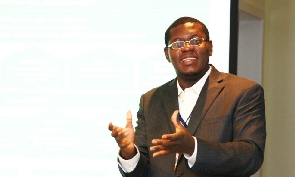 Vice-president of IMANI Africa, Bright Simons
Vice-president of IMANI Africa, Bright Simons
In a damning exposé, prominent governance analyst and Vice President of the think tank IMANI Africa, Bright Simons, has alleged that powerful individuals in Ghana are facilitating the illegal importation and distribution of dangerous opioids into the country.
His claims follow a recent BBC documentary that revealed how Indian-made opioids, particularly Tafrodol, are flooding Ghana’s market, leading to a growing addiction epidemic.
In his write-up sighted by GhanaWeb, Simons highlighted that Ghana has become a key entry point for these opioids, with millions of pills being distributed locally and across West Africa.
He cited customs data showing that Indian companies such as Aveo, Westfin International, and PRG Pharma have been exporting these drugs to Ghanaian companies, including Samospharma, a local pharmaceutical firm.
Despite denials from Samospharma, Simons pointed to evidence suggesting the company’s involvement in the trade.
“As far as the export data was concerned, the company has not been smuggling in these items. It has been trading in the open with established firms in India and elsewhere to the tune of millions of dollars. My conclusion, therefore, was that it was operating with the full knowledge of the authorities.
“What is more, Samospharma’s founders are highly respectable members of the pharmaceutical industry. They are, furthermore, the visionaries behind a widely acclaimed digital platform, DrugNet, designed to ensure the safe delivery of high-quality medicines and to prevent the trade in substandard pharmaceutical products,” he wrote.
FDA’s failures and murkiness
Simons also criticized Ghana’s regulatory bodies, including the Food and Drugs Authority (FDA), for failing to address the crisis effectively.
While the FDA confirmed that Tafrodol and its components are not registered in Ghana and are therefore illegal, it also revealed that Samospharma has legitimate business relationships with Aveo and Westfin for other products.
This contradiction, according to Simons, demonstrates a deliberate lack of transparency and accountability.
“Despite the FDA’s emphatic confirmation that these drugs are illegal from the outset, the National Security Agencies and the preventive units within the Customs agencies continue to pretend that they have no information to tackle the menace head-on. They continue to talk in very broad and general terms about stopping the flow of opioids, the same talk we have been hearing for a decade,” he added.
Powerful forces at play
Simons alleged that the opioid trade is being orchestrated by powerful individuals within Ghana’s political, business, and bureaucratic circles.
He argued that these forces are deliberately creating confusion to shield themselves from scrutiny.
“Everything converges upon my initial theory: the whole saga isn’t adding up because someone or a group of very powerful people in Ghana with tentacles crisscrossing politics, business, and the bureaucracy, and protected by a shield transcending political administrations is the mastermind behind these opioid massacres,” he wrote.
International implications
Bright Simons noted that some of the drugs imported into Ghana are being smuggled into neighboring countries, including Niger, where proceeds from the trade are allegedly funding armed insurgencies and contributing to regional instability.
“We have had Nigeriens and other Sahelians using Ghana as an open gateway to import millions of dollars’ worth of these opioids. We now know that some of this money is fueling the armed insurgencies and other forms of insecurity plaguing the subcontinent,” he added.
Bright Simons called on Ghanaian authorities to take decisive action to stem the flow of opioids into the country.
Read the full write-up below:
Someone very powerful wants to flood Ghana with poisons – Bright Simons
ID/MA
Watch the latest edition of BizTech below:
Click here to follow the GhanaWeb Business WhatsApp channel
#SONA2025: What President Mahama said about current state of Ghana’s sports sector
President John Dramani Mahama has voiced concerns over the current state of Ghana’s sports sector, pledging immediate and comprehensive reforms to “reclaim our rightful place on the global sports stage.”
In his first State of the Nation Address to Parliament on Thursday, February 27, since taking office, the President highlighted the declining performance of various sports, particularly boxing, athletics, and football.
He expressed particular concern about the disappointing results of the national senior men’s football team, the Black Stars, and revealed that he has directed his office and the Ministry of Sports and Recreation to hold the Ghana Football Association accountable to the people of Ghana, especially during the upcoming 2026 World Cup qualifiers.
The President also assured that there would be full transparency regarding government spending on national teams, with the budgets submitted by the Football Association and other sports bodies being made public.
Recognizing the importance of youth development, he announced plans for a major overhaul of grassroots sports, which will include the creation of a School Sports Authority.
Regarding infrastructure, the President emphasized the government’s commitment to renovating existing national stadiums, completing youth resource centers, and building new sports facilities in the newly created regions.
Read the full statement on sports:
Mr. Speaker, Ghana’s sports sector, once again, which was a shining example of excellence within Africa, now finds itself at a very critical juncture. Historically, our nation has been celebrated and has had remarkable achievements in boxing, football and athletics. Unfortunately, this is no longer the case.
However, recent years have unveiled depressing structural deficiencies in administration, funding, infrastructure and talent development. Immediate and comprehensive reforms are imperative to reclaim our rightful place on the global sports stage.
Mr. Speaker, we will develop a comprehensive national sports policy to align with international norms. This policy will be accompanied by an exhaustive review of the Sports Act of 2016, that is, Act 934, and the rigorous enforcement of the Sports Regulations 2023, LI 2477.
Infrastructure development remains paramount in our strategy. The government is committed to refurbishing existing national stadiums, completing youth resource centers and constructing new sports facilities in the new regions.
We will also prioritize community recreational facilities to foster greater participation in sports at the grassroots level. Recognizing the critical role of youth development, we are implementing a significant overhaul of grassroots sports with the establishment of the School Sports Authority.
This body will oversee structured inter-school competitions and talent identification initiatives essential for nurturing future sporting champions. Over 60 per cent of Ghana’s elite athletes have emerged from these school sports programs.
The Ministry has now been renamed the Ministry of Sports and Recreation. To acknowledge the significance of recreation, we will launch a National Recreation Day. This will be a monthly initiative centered on community engagement alongside an annual National Recreation Festival. These initiatives will encourage keep-fit activities and promote active lifestyles. It will promote traditional games and strengthen community bonds.
Next month, the senior national team, the Black Stars, which is now a pale shadow of its former glory, will play two World Cup qualifying matches. I have instructed my Office and the Minister for Sports and Recreation to hold the Ghana Football Association accountable to the people of Ghana as we prepare for these games, especially regarding the budget of the FA.
There will be no secrecy in how much the government spends on the national teams. The budgets presented by the FA and other sports associations must be known by the public.
After all, it is the taxpayers’ funds that are used to fund these activities. The reduction in government expenditure and waste reduction applies to all sectors of the economy, including the Ministry of Sports and Recreation.
Bartenders’ Masterclass Empowers Over 50 Professionals
The participants after the masterclass
The second edition of the Bartenders’ Masterclass, organised as part of the Ghana Beverage Awards, was held in Accra recently leaving a lasting impact on Ghana’s beverage and hospitality industry.
The event, organised as part of the efforts to groom young talents for the bartending profession and retool already existing practitioners, brought together stakeholders and well-wishers of the beverage industry as well as members of the bartending profession.
Under the guidance of Tapatheo Amu Nyamekye, Operational Bars Manager for Mood Bar and Exhale Lounge, who doubles as Head Trainer for the Diageo Bar Academy Ghana, over 50 participants underwent rigorous training in various facets of the bartending profession. From mastering the latest mixology techniques to making the best out of mentorship opportunities attendees delved deep into the art of mixology and mentorship.
The Masterclass also featured a practical session, where selected participants were provided the opportunity to practise what they had learnt while leaving an indelible mark in the minds of onlookers with a showcase of their creativity. The outcome was the delivery of unique and inventive cocktails that impressed all present.
Emma Wenani, Chief Director of Global Media Alliance, organisers of the Masterclass, commended the participants for making time to invest in their professions by enrolling for the masterclass. She emphasised the significance of their commitment to continuous learning and advancement in the field of mixology.
“I’d like to applaud your dedication to your craft through your participation in this masterclass. I am thrilled by the turnout which is a convergence of talent, passion, and innovation in the art of mixology. Your being here shows that you’re committed to learning more about the art of bartending so as to climb the ladder of your profession to the top. As we navigate an ever-changing landscape, characterised by shifting consumer preferences and emerging trends, it’s essential to stay agile and innovative. Embrace experimentation, embrace diversity, and never stop learning,” she said.
Taking turns, some participants shared their experiences.
“Being part of this training session has really been an eye-opener for me. It’s been incredibly informative, providing valuable insights into mentorship and mixology. I am grateful to the organisers for putting together such a wonderful event, and I look forward to participating in future editions” Matthew Ayi said.
On her part, Corny Boateng, a bartender with Front/Back Accra shared: “It was a rewarding experience to see my creation being enjoyed by judges and fellow participants. Moreover, the Masterclass provided a great platform for networking and connecting with industry peers and experts. I had the chance to exchange ideas, learn from others, and forge new connections that I believe will benefit me in my career moving forward.”
Through the Ghana Beverages Awards, Global Media Alliance has over the past 9 years, contributed to the advancement of the beverage industry with the aim to inspiring excellence in the beverage industry. The annual bartender’s masterclass forms part of its strategic objective of elevating the works of all players within the beverage industry value chain.
A Business Desk Report
Ghana’s public debt hits GHS721bn; ECG owes GHS68bn, COCOBOD GHS32.5bn – Mahama
President John Dramani Mahama has delivered a stark assessment of Ghana’s economic situation, describing the nation as “broken on many fronts” due to staggering debt and financial mismanagement.
Presenting his first State of the Nation Address (SONA) of his second term to Parliament in Accra on Thursday, February 27, he painted a grim picture of the country’s finances, pointing to unsustainable debt levels and mismanagement of key state institutions.
James Agbey urges calm as NDC supporters express frustrations at party headquarters
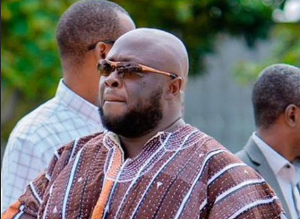 James Agbey has called for calm among the party members
James Agbey has called for calm among the party members
A leading operative of the National Democratic Congress (NDC), James Agbey, has called for calm among party supporters following disturbances at the NDC’s national headquarters on Wednesday, February 26, 2025.
In a statement issued on Thursday February 27, 2025, Agbey expressed deep concern over the protests, emphasizing that such actions serve as an unnecessary distraction from the government’s urgent responsibilities.
“These public manifestations are a needless distraction from attending to the pressing needs of the nation. Our government has urgent and pressing concerns that directly affect the lives and livelihoods of the Ghanaian people. It is imperative that we, as party activists, focus our energy on helping the government resolve these issues,” he said.
Acknowledging that some grievances may be valid, Agbey urged supporters not to allow frustration to overshadow reason.
He pointed out that President John Dramani Mahama has been in office for just over a month and has already made significant progress in governance, political participation, and appointments.
“President Mahama has done fairly well in all aspects of governance so far. He needs the support of everyone to make his vision a reality for the collective good of the NDC and Ghana,” he stated.
Agbey also cautioned against using open confrontation and inflammatory public statements to express dissatisfaction, warning that such actions could be detrimental to the party’s image and unity.
“Our actions must serve our people and benefit the country and the party we all love. Let us strive to uphold prudence, reason, and dignity in our words and actions for the good of the NDC and Ghana,” he urged.
The call for calm comes amid growing tensions within the party, with some members reportedly voicing concerns over internal matters.
Agbey’s appeal is seen as an effort to prevent internal divisions from overshadowing the party’s broader goals.
John Mahama sends strong signal to GFA, other associations on budgets
President John Mahama has assured Ghanaians that his government will ensure full transparency regarding expenditure on national teams and sports-related activities.
Speaking during the 2025 State of the Nation Address (SONA), he emphasized that all budgets submitted by the Ghana Football Association (GFA) and other sports bodies would be made publicly accessible.
“There will be no secrecy on how much the government spends on the national teams. The budgets presented by the GFA and other associations must be known by the public. After all, it’s the taxpayers’ funds that are used to fund these activities,” Mahama stated.
Additionally, he reaffirmed his government’s cost-cutting measures, stressing that reductions in government expenditure would apply to all sectors, including the Ministry of Sports and Recreation.
“The reduction in government expenditure applies to all sectors of the economy, including the Ministry of Sports and Recreation,” he added.
This declaration aligns with Mahama’s broader agenda of accountability and fiscal responsibility, ensuring that funds allocated to sports development are efficiently utilized and transparently managed.
‘I am committed’ – Rex Omar expresses gratitude after presidential appointment
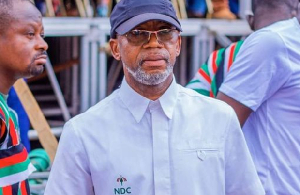 Rex Omar was appointed as a Presidential Staffer for the Black Star Experience,
Rex Omar was appointed as a Presidential Staffer for the Black Star Experience,
Renowned highlife musician Rex Owusu Marfo, popularly known as Rex Omar, has expressed deep gratitude following his appointment as a Presidential Staffer to coordinate the Black Star Experience, a flagship program under the Office of the President.
In a Facebook post on February 27, 2025, Rex Omar thanked President John Dramani Mahama for the opportunity to contribute to Ghana’s tourism, arts, and culture sectors.
Describing the appointment as both an honor and a profound responsibility, he praised President Mahama for creating the new portfolio, calling it “a testament to the government’s commitment to developing the arts and culture sector.”
“This opportunity to contribute to our nation’s progress and to work alongside you and your administration is both a privilege and a profound responsibility that I do not take for granted. I am grateful for your confidence in my abilities and your vision for a brighter future for our country,” he wrote.
Rex Omar pledged to work diligently while upholding the values of integrity, dedication, and service.
He also expressed his commitment to collaborating with relevant ministries and agencies to achieve the program’s goals and meet the expectations of the President and the Ghanaian people.
“I am committed to working diligently, upholding the values of integrity, dedication, and service as I take on this role. Together, I believe that with your guidance, we can achieve meaningful change and create opportunities for all our citizens, especially the youth. Thank you once again for this incredible opportunity,” he added.
About the Black Star Experience
The Black Star Experience is a government initiative designed to redefine Ghana’s cultural identity, promote tourism, drive economic growth, create sustainable employment opportunities, and position Ghana as a leading cultural destination.
The program aligns with President Mahama’s vision to harness the potential of the creative arts and tourism sectors for national development.
Rex Omar’s appointment has been widely celebrated by industry stakeholders, who see it as recognition of his decades-long contribution to Ghanaian music and culture.
See the post below:
ID/MA
Click here to follow the GhanaWeb Entertainment News WhatsApp channel
Meanwhile, watch how D-Black reacted to Tolon MP’s demeaning ‘movie industry’ remark
My government will not cancel Free SHS, we will improve it
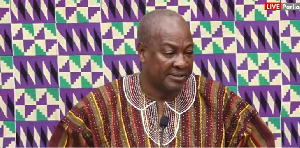 President John Dramani Mahama delivering his SONA in January 2025
President John Dramani Mahama delivering his SONA in January 2025
President John Dramani Mahama has assured Ghanaians that the government will not cancel the Free Senior High School program initiated by the Nana Addo Dankwa Akufo-Addo government in 2017.
Delivering the first State of the Nation Address of his second term on Thursday, February 27, 2025, he stressed that his government would rather enhance the program by addressing the current challenges.
“Mr Speaker, let me repeat it once again. I, John Dramani Mahama, will not cancel the Free SHS Programme. I will rather make it better from the implementation problems that it has been facing,” he stated.
He assured parents and students that his administration was dedicated to enhancing the quality of education and ensuring that the programme serves the best interests of Ghanaian students.
President Mahama criticised the previous administration for mismanaging the initiative, arguing that the number of beneficiaries had been inflated for political gain.
He noted that this had put immense pressure on the education system, leading to overcrowded classrooms, inadequate infrastructure, and insufficient teaching resources.
He reiterated his vision of making Free SHS more effective by addressing its shortcomings and implementing reforms that would enhance access, quality, and sustainability.
“Our focus is to improve learning conditions, provide adequate resources, and ensure that students receive the best education possible,” he stressed.
Background:
President Mahama’s address, which is in line with Article 67 of the 1992 Constitution, and which is expected to outline his ambitious “Resetting Ghana” agenda, aims at tackling economic challenges, creating jobs, and restoring stability.
In his address, the president is expected to touch on key areas of his government’s policy objectives.
He is also expected to provide updates on the state of Ghana’s economy, including the ongoing IMF bailout program, security, and the cost of living, among other issues.
Additionally, he will update Ghanaians on deliverables for the year ahead, as well as the achievements of his government so far and the challenges that lie ahead.
JKB/EK
Watch as President Mahama delivers 7th State of the Nation Address
President John Mahama’s full 2025 State of the Nation Address in Parliament
President John Dramani Mahama presented the maiden State of the Nation Address (SONA) of his second term on the floor of Parliament on Thursday, February 27, 2025, in accordance with Article 67 of the 1992 Constitution.
President Mahama, among other things, said that the state of the economy he inherited from Nana Addo Dankwa Akufo-Addo is worse than initially anticipated.
He, however, indicated that he is going to fix the problems of the country and not lament about it.
The president also gave an update on the work of the “Operation Recover All the Loot” (ORAL), which collected information on alleged misappropriation of state resources by the previous government.
The president also provided an update on the status of the Agenda 111 hospital project initiated by the Akufo-Addo government.
He also promised that his government was not going to cancel the Free Senior High School programme.
Read his full statement below:
BAI/MA
Hold GFA accountable for World Cup qualifiers – President Mahama tells sports minister
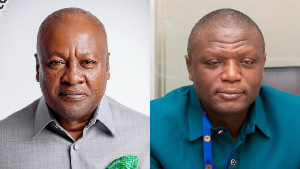 President John Mahama and Minister of Sports and Recreation, Kofi Adams
President John Mahama and Minister of Sports and Recreation, Kofi Adams
President of the Republic of Ghana, John Dramani Mahama, in a bold move to promote transparency and accountability, has instructed the Minister of Sports and Recreation, Kofi Adams, to keep a close eye on the Ghana Football Association (GFA) as the Black Stars prepare for their upcoming World Cup qualifying matches in March 2024.
This directive came during President Mahama’s first State of the Nation Address (SONA) of his second term on Thursday, February 27, 2025.
“Next month, the senior national team, the Black Stars, which is now a pale shadow of its former glory, will play two World Cup qualifying matches. I’ve instructed my office and the office of the Minister of Sports and Recreation to hold the Ghana Football Association accountable to the people of Ghana as we prepare for this game,” he said.
The Black Stars currently sit second in Group I, level on points with leaders Comoros, with nine points from four matches.
They would face Chad in Accra on March 19 and then travel to Morocco to face Madagascar on March 24, 2025.
Meanwhile watch GhanaWeb’s breakdown of the uproar triggered by Jamie Carragher’s comments on the AFCON and Mo Salah below:
Also, watch as Ahiafor explodes at Habib over ‘insulting’ deputy minister question
FKA/EK
‘I need help’ – Freed from Myanmar’s scam centres, thousands are now stranded
“I swear to God I need help,” said the man quietly on the other end of the line.
The Ethiopian, who calls himself Mike, said he is being held with 450 others in a building inside Myanmar, along the country’s border with Thailand.
They are among the thousands of people who have been freed from the notorious scam compounds that have thrived on the border for years, in what appears to be the toughest action so far against the industry along the Thai-Myanmar border.
But many of them are now stranded in Myanmar in makeshift camps because the process of assessing them and arranging flights back to their own countries is so slow.
The armed militia groups who are holding them have a very limited capacity to support so many people – more than 7,000. One of them has said they have stopped freeing people from the compounds because they are not being moved to Thailand fast enough.
The BBC understands that conditions in the camps are unsanitary, food barely sufficient, and many of the freed workers, like Mike, are in poor health. He is suffering from panic attacks, after working for a year in a scam centre where he was routinely beaten.
He told us they got two very basic meals a day, there were only two toilets for 450 people, who he said were now relieving themselves wherever they could.
Mike described being invited a year ago to take up what he was promised would be a good job, in Thailand, requiring only good English language and typing skills.
Instead he found himself subjected to a brutal regime, forced to work long hours every day to meet the target for defrauding people online set by his Chinese bosses.
“It was the worst experience of my life. Of course I was beaten. But believe me I have seen a lot worse done to other people.”
Mike is one of an estimated 100,000 people who are believed to have been lured to work in the scam operations along the Thai-Myanmar border, most of them run by Chinese fraud and gambling operatives who have taken advantage of the lawlessness in this part of Myanmar.
Despite horrifying accounts of abuse from those who escaped in the past, thousands still come from parts of the world where good jobs are scarce, enticed by promises of good money.
China, where many of the scam victims come from, has acted to shut down scam operations along its own border with Myanmar, but until this year neither China nor Thailand had done much about the Thai-Myanmar border.
Ariyan, a young man from Bangladesh, has come back to Thailand to try to help 17 friends who are still there. He said he made a promise to himself to do this after his own gruelling escape from one of the most notorious scam centres last October.
He showed us a brief, shaky video of the compound, still under construction in a remote, forested valley, where he was held, and remembers the terrible treatment he and his friends suffered at the hands of their Chinese boss.
“They gave us a target every week, $5,000. If not, they gave us two electric shocks. Or they put us in a dark room, with no windows. But if we earned a lot of money, they were very happy with us.”
Ariyan had to approach men in the Middle East and lure them into transferring funds to fictitious investments. Using AI, the scammers made him appear on the screen to be an attractive young woman, altering his voice as well.
He says he hated doing it. He remembers one man who was willing to sell his wife’s jewellery to fund the fraudulent investment, and wishing he could warn him. But he said the bosses monitored all their calls.
The release of the scam workers started more than two weeks ago after Thailand, under pressure from China and some of its own politicians, cut power and telecommunications links to the compounds on the border.
It limited banking access to the scam bosses and issued arrest warrants for some of the militia leaders who had been protecting the business.
That hit the business, but it also hit the ordinary Karen people who live nearby even harder, putting pressure on the militia commanders to show willingness in ending the abuses in the scam centres. They began helping those trying to escape, and completely evacuating some compounds.
The camp Mike is housed in is now being guarded by the Democratic Karen Benevolent Army, DKBA, a breakaway insurgent faction of the ethnic Karen community.
Until recently, it was protecting the many scam compounds which have sprung up in its territory. You can see them easily as you drive along the Moei River which divides the two countries – unlikely expanses of new buildings over in war-torn Karen State contrasting with the rural landscape on the Thai side of the border.
Thailand insists it is moving as fast as it can to process the former scam workers and get them home.
A group of 260 freed workers were brought over the Moei River on a raft earlier this month. And around 621 Chinese nationals were flown straight back to China with a police escort on chartered planes. Otherwise, the movement of freed workers to Thailand seems to have stalled.
The problem is that they are from many different countries, some of which are doing little to help get their people home. Around 130 of the first 260 who came over are from Ethiopia, which does not have an embassy in Bangkok.
The BBC has been told that some other African countries will only fly their people home if someone else pays. Most of the freed workers have nothing; even their passports were withheld by the compound bosses.
Thailand fears bringing over thousands of people it will then have to look after indefinitely. It also wants to screen them to find out which are genuine victims of human trafficking and which may have committed criminal acts, but does not have the capacity to do this with such a large group of people.
Different ministries and agencies, including the army, are involved in managing this problem, and have to agree who does what. It does not help that several senior police and immigration officers have been transferred over their alleged involvement in the scam business.
“If this issue is not resolved, then we will not stop working on it – we must work seriously,” said Thai Prime Minister Paetongtarn Shinawatra on Tuesday in Bangkok. But she was referring to the wider problem of the scam business, not the growing humanitarian crisis among the freed workers.
“Unfortunately, it seems we’re in a bit of a standstill,” says Judah Tana, an Australian who runs an NGO which has for years been helping the victims of trafficking in the scam centres.
“We are hearing distressing information about the lack of sanitation and toilets. Many of the 260 who already came were screened for TB and tested positive. We are hearing from those who are still inside that people are coughing up blood. They are very happy that they have been liberated from the scam compounds, but our worry is that we’re not engaging fast enough.”
Thailand now seems ready to bring over one group of 94 Indonesians, as their embassy has been pushing for their release for several days and has booked flights to Indonesia for them.
But that still leaves more than 7,000 still inside Myanmar, unsure what will now happen to them.
Mike told me he and many others with him feared that if they are not allowed to cross into Thailand soon, the DKBA may hand them back to the scam bosses, where they could face punishment for trying to leave.
On Wednesday night his panic attacks and breathing were so bad, he said, they took him to hospital.
“I just want to go home,” he said over the phone. “I just want to go back to my country. That is all I am asking.”
“Weapons, Phones, Condoms…” Housemaster of Keta Senior High Reveals Items Seized From Students
“Weapons, Phones, Condoms…” Housemaster of Keta Senior High Reveals Items Seized From Students
News Hub Creator3h
The senior housemaster of Keta Senior High School has put on display a collection of items confiscated from students over the years. The collection includes condoms, weapons, mobile phones, and other prohibited items.
The display aims to highlight the various items that students have attempted to bring into the school, despite strict regulations. The school has a comprehensive set of rules to ensure a safe and conducive learning environment. These rules prohibit students from possessing certain items, including weapons and mobile phones.
The housemaster emphasized the importance of adhering to school regulations. He noted that the confiscated items serve as a reminder of the challenges faced by the school in maintaining discipline and order. The display is intended to educate students about the consequences of violating school rules and to discourage them from bringing prohibited items to school.
The collection includes a wide range of items, from everyday objects like mobile phones to more concerning items like weapons. The presence of condoms in the collection has also raised discussions about the need for comprehensive sex education and awareness among students.
This display has sparked conversations among students, parents, and staff about the challenges of maintaining discipline in a school environment. It serves as a stark reminder of the need for vigilance and cooperation in creating a safe and supportive learning environment for all students.
See video here;
https://x.com/SIKAOFFICIAL1/status/1895018106696634767?t=15x0z7d4MTUZ35mqkJ9fNg&s=19
Mummies, Here Are Comfy Maxi Dress Styles You Can Style From Any Materials Of Your Choice
Mummies, Here Are Comfy Maxi Dress Styles You Can Style From Any Materials Of Your Choice
News Hub Creator1h
Maxi dresses are a perfect choice for mothers who want to combine style with comfort in their everyday outfits. These long, flowing gowns provide ease of movement, making them ideal for both casual outings and special occasions. Since they can be made from different materials, they offer flexibility in design, allowing each mother to choose what suits her needs best. Soft cotton fabrics are excellent for warm weather, as they allow air to circulate freely, keeping the body cool throughout the day. For a more elegant appearance, silk or chiffon can be used to create a graceful and sophisticated look.
The versatility of maxi dresses ensures that they can be styled in various ways, depending on personal preferences and the event at hand. A fitted waistline can add structure to the dress, enhancing the body’s shape while still maintaining comfort. Flared designs offer a more relaxed feel, making them suitable for lounging at home or running errands. With the right accessories, a simple maxi dress can be transformed into a stunning outfit for formal gatherings. A statement belt can highlight the waist, while jewelry and stylish footwear can elevate the entire look.
Mothers who prefer a modest approach can opt for long-sleeved or high-neck designs, ensuring coverage while still appearing fashionable. Those who enjoy vibrant fashion may choose bold prints or bright colors to add energy to their appearance. The choice of fabric also determines the level of sophistication a dress exudes, with lace or satin offering a luxurious feel. Whether worn with sandals for a relaxed look or paired with heels for elegance, maxi dresses provide endless styling possibilities. With the right choice of material and design, any mother can feel confident and stylish while prioritizing comfort in her daily fashion.
Order ECG and NEDCo to publish timetable to guide the current load shedding – Minority to Mahama
The Minority in Parliament has called on President John Dramani Mahama to take immediate action in addressing the ongoing power crisis, popularly known as “dumsor,” following his first State of the Nation Address (SONA).
The Minority’s statement, delivered by the Member of Parliament (MP) for Nhyiaeso, Stephen Amoah, expressed deep concern over the worsening power situation and its adverse effects on businesses and livelihoods.
Mr Amoah highlighted the growing frustration among citizens, particularly business owners, due to the erratic power supply.
“Ladies and Gentlemen, we have seen the return of Electric Generating Sets (Generators) in front of people’s shops. We have also now seen more people carrying Yellow Gallons to buy fuel for the purpose of operating their generator sets,” he stated.
Drawing a historical parallel, he remarked that just as the country had “Kufuor Gallons” for storing water during past crises, these fuel containers could now be aptly referred to as “Mahama Gallons.”
The Minority further criticised the lack of a structured approach in managing the load shedding, making it difficult for businesses and individuals to plan effectively.
“We wish now to call on President Mahama to cause ECG and NEDCo to publish a Timetable to guide the current load shedding, which at the moment is not good for planning by people and businesses,” Mr Amoah asserted.
He emphasised that transparency in the energy sector is crucial for mitigating the economic losses suffered by small and medium-sized enterprises.
DISCLAIMER: The Views, Comments, Opinions, Contributions and Statements made by Readers and Contributors on this platform do not necessarily represent the views or policy of Multimedia Group Limited.
‘Nkukor Nkitinkinti’ Project Will Benefit 55,000 Households – Mahama
President John Mahama
President John Mahama has affirmed that his government is keen on ensuring that the flagship proposed poultry programme tagged, “Nkukor Nkitinkinti,” project will benefit a total of 55,000 households across the country.
Speaking during the State Of the Nation Address (SONA) President Mahama was optimistic that the project is a potential solution to the country’s high youth unemployment while adding that when fully implemented, it will reduce Ghana’s annual poultry import of $300 million.
The programme, which forms part of the National Democratic Congress (NDC) manifesto, aims to boost poultry production and create jobs for the youth through enhanced support for poultry farmers, affordable feed production, and expanded veterinary services.
It will be recalled that during the vetting of the Minister of Agriculture Minister-designate, Eric Opoku, Minority Leader Alexander Afenyo-Markin shared the hope of the project indicating that the project stands a chance of alleviating the pressure the youth unemployment crisis places on the political class.
“I heard it from President, Mahama, and for me as an entrepreneur, knowing the pressure from our youth on all of us as a political class, beyond the political rhetoric, I believe that if it is implemented, it will help the youth because a lot of them are dejected in this country. They don’t have jobs, and the pressure is on us,” he stated.
BY Prince Fiifi Yorke
Someone very powerful wants to flood Ghana with poisons – Bright Simons
Sweet and beguiling poisons
Barely a week ago, the BBC aired a documentary with a harrowing message: deadly opioids made in India have flooded Ghana’s market, creating throngs of enslaved addicts.
Chilling footage showed the Chief Executive (CEO) of a Mumbai-based pharma company, Aveo Pharmaceuticals, a man called Vinod Sharma, brazenly confessing to undercover journalists how poisonous a certain concoction he has dreamt up is to the bodies of those unfortunate enough to become addicted. All these facts were delivered deadpan amidst bouts of intense self-praise of his own ingenuity.
Vinod’s concoction, Tafrodol, is a combination of a powerful and addictive painkiller, Tapentadol, and a strong muscle relaxant, Carisoprodol. Each drug is considered risky enough that it has been placed in “controlled” categories or outrightly banned in several countries, as is the case with Carisoprodol in the European Union (EU), for instance. When combined, however, their risks accelerate through the roof.
No country in the world allows the legal sale of Tapentadol-Carisoprodol combinations as the formulation makes no sense clinically and the prospects of abuse and harm are so high as to render them literal poisons.
Ghana, the soft touch paradise
According to the Vinod, Nigeria has been cleaning its act and tightening its borders. For that reason, he advised the undercover journalists posing as drug traffickers to use light-touch Ghana where it is easier to clear the poisons from the ports for wider distribution across the West African region.
Of course, millions of these dangerous pills stay in Ghana. The BBC documentary included grim and brutal footage of the effects of what amounts to an addiction epidemic in Tamale and other parts of Ghana. Which naturally raises the question: who is facilitating the entry of these opioids into the country?
Where are the kingpins of the trade?
Only one Ghanaian company was mentioned on the video: Samospharma. And even then only briefly, in an almost offhand manner. For those of us in Ghana, though, that angle was far from a sideshow. Who is enabling Vinod and Aveo in their quest to get their wondrous poisons into every Ghanaian bloodstream? We couldn’t let the matter rest that easily.
Thus, I took to social media to elaborate on the angle based on my side-knowledge of the months-long BBC investigation and additional work I had done since then.
Central to my line of argument was the openness with which Samospharma appeared to have conducted its business. There were reams of customs data showing exports of various opioids/addictive analgesics from India to Samospharma, not just from Aveo and its affiliate, Westfin, but also PRG Pharma and others.
Open Season or hiding in plain sight?
As far as the export data was concerned, the company has not been smuggling in these items. It has been trading in the open with established firms in India and elsewhere to the tune of millions of dollars. My conclusion therefore was that it was operating with the full knowledge of the authorities.
What is more, Samospharma’s founders are highly respectable members of the pharmaceutical industry. They are, furthermore, the visionaries behind a widely acclaimed digital platform, DrugNet, designed to ensure the safe delivery of high-quality medicines and to prevent the trade in substandard pharmaceutical products.
One or more of the company’s principals has even served on powerful advisory boards overseeing the digitalisation of Ghana’s pharmacy environment, under the aegis of the lead regulator, the Pharmacy Council, itself. I myself have read about some of these exploits with much admiration. The data pointing to their involvement simply didn’t add up.
Murkiness is the way
As a longtime governance analyst with a soft spot for Ghanaian policy matters, I have become used to murkiness.
Nothing ever seems resolvable to the satisfaction of anyone, not even the mainstream elite commentariat. Everything is debatable and decked out in shades of grey. I have hence come to always expect massive pushback no matter how clear and unimpeachable the evidence I use in my work.
All my experience notwithstanding, I have been quite perplexed about the happenings in the aftermath of my social media post.
A few people reached me to let me know that Samospharma’s principals are unhappy to have been mentioned at all. Some touched base on behalf of government-related entities. All understandable, I thought.
Threats & Strategic Lawsuits Against Public Participation (SLAPP)
But then on Monday, the 24th of February, I received a strongly worded email and a copy of a public statement issued by Samospharma that rattled me a bit.
Apart from the statement categorically denying everything said about them in the BBC documentary, one of the co-founders, Dr. Otuo-Serebour, also described my “commentary on Samospharma and DrugNet on X and LinkedIn” as “grossly misleading”. I was asked to immediately take down the posts under the implied threat of a lawsuit.
This habit of private companies threatening analysts and journalists with lawsuits to prevent public interest commentary has become rampant in Ghana nowadays but I found it odd that Samospharma would resort to such a tactic given the nature of the subject. Engagement around the facts without the threats would have been far more prudent in my view. Anyway.
Of categorical denials & ardent confusion
Given the strident tone of the statement and the emphatic nature of the denials, I reproduce the full statement below:
In subsequent press engagement, Samospharma also denied any relationship whatsoever with Aveo, Westfin or PRG.
Now, my bafflement had peaked! Essentially, what Samospharma was saying was that all the customs data the BBC and analysts like myself had relied upon from the India-export side was either fabricated by the Indian authorities or the product of an elaborate corporate heist in which its identity had been hijacked by persons unknown to conduct fraudulent trades in opioids. I was gobsmacked.
Enter the Authorities
As if that wasn’t enough head-spinning to last a week, the Ghanaian Food & Drugs Authority (FDA) soon thereafter issued a statement contradicting parts of Samospharma’s story. It turns out Samospharma had indeed explicitly communicated business relationships with Aveo and Westfin to the FDA. Only that Aveo and Westfin had been presented as middle-men between certain manufacturers and Samospharma and indeed for drugs other than opioids. Totally perplexing.
At any rate, some editors were livid. Why had Samospharma denied any knowledge of or relationship with Aveo and Westfin, the two companies in the eye of the storm following the BBC documentary, when the regulatory data is so ambiguous? Could it be that the principals are not even the primary decision-makers here? Are there some powerful forces in the background?
Probing further to sound the depths
I had to probe further. Let’s start with what is totally unambiguous.
The FDA confirmed that the drugs concerned – tafrodol, tapentadol, and carisoprodol, as well as their various combinations – are not registered in Ghana and therefore that any importation or trade in them is totally illegal. Full stop.
They also confirmed that Samospharma does import products from Aveo and Westfin. However, those products are not opioids, and they are not made by Aveo or Westfin. Aveo is simply just a conduit. They did not discuss PRG or other companies found in Indian export data as linked to the opioid trade in Ghana.
According to the FDA, the products in question are:
- Timonidin Eye Drops – made by Indiana Ophthalmics in Gujarat and exported to Samospharma in Ghana by Westfin International and Aveo Pharmaceuticals at different times.
- Samocef Injection (antibiotic) – made by Kilitch Drugs in Mumbai and exported to Samospharma in Ghana, also by Westfin.
- Prolatan Eye Drops – made by Indiana Ophthalmics and exported to Samospharma in Ghana by Aveo Pharmaceuticals.
In short, Aveo is some kind of distributor for Timonidin, Prolatan, and Samocef. In that capacity, it has supposedly been intermediating between the manufacturers in India and Samospharma in Ghana.
A simple but disastrous misapprehension by the BBC?
Could all this be explained away as the overzealous action of a local company trying to distance itself from foreign companies it had done legitimate business with in the past because they have unfortunately now been caught up in a scandal?
That would have been a nice way to tie everything up, heave a sigh of relief, and then focus on tightening our borders.
Except that it doesn’t still explain how exactly the millions of pills got to places like Tamale. Who is bringing them into Ghana from Aveo, PRG, Westfin, and the others? Moreover, the Samospharma situation is somewhat more complex than that.
The confusion deepens
Let us look a bit more closely at the three drugs mentioned by the FDA as being imported into Ghana by Samospharma through Aveo.
Samocef is a brand owned by Samospharma. Kilitch Drugs is a mere contract manufacturer, producing the medicine according to specifications developed by Samospharma. A fact that explains neatly why the product is not listed in Kilitch’s own product catalog.
Timonidin is likewise a brand of Samospharma itself. Indiana only manufactures the product on behalf of Samospharma. Hence why it does not list the product in its own catalog. India’s equivalent brand is called Timolol, a nod to “Timolol Malleate”, the same active ingredient found in Timonidin.
It is totally inconceivable that Samospharma would appoint Aveo as an intermediary to obtain medicines from its own contract manufacturers. Especially when the products concerned are actually its own bona fide brands.
In fact, Samospharma retains the right to switch manufacturers, which is probably why Kilitch’s marks are now on Timonidin even though, per FDA records, the product is manufactured by Indiana.
Prolatan is a whole other level of confusion. According to the FDA, it is made by Indiana Ophthalmics on behalf of Samospharma. The packaging however suggests that it is made by Sudarshan Pharma Industries Limited in Mumbai.
Yet, there is an active trademark for that exact same product name owned by Sentiss Pharma. Talk of bewildering!
At any rate, in all three instances, it is totally inexplicable why Samospharma would need to insert Aveo and Westfin into the middle of its transactions with contract manufacturers. Unless, of course, Aveo and Westfin were already shipping goods they have manufactured for Samospharma and were adding stocks from other companies to the same containers, as an aggregator would do, to cut costs. Yet, this more plausible explanation appears to conflict with both the FDA’s and Samospharma’s telling.
And why is it that when the BBC undercover investigators went to a DrugNet branded retail outlet owned by Samospharma, they found tafrodol on sale? Which local distributor supplied those units, then, given the lack of official import records?
Digging into Ghana Customs Data
The only way to even start tying up any of these loose ends was to look at customs data from the Ghana side closely, forensically. So, we did just that.
Whilst the deep dive into import-side customs data did shed a bit more light on some matters, in many ways it confused the picture further.
For example, whilst some records (such as, for example, Bill of Entry/BOE 40423134210) did indicate clearly that Sudarshan was the exporter of Prolatan Eye Drops to Samospharma on some occasions, there were several other BOEs that listed Aveo (e.g. BOE: 40623233912), Accelius Global (e.g. BOE: 40623241075), Kilitch (e.g. BOE: 40823371968), and PRG (e.g. BOE: 40823372206) as the exporters on various different occasions.
In short, any company could be indicated on the manifest as the exporter regardless of what is written on the pack. Furthermore, the declarations have limited regulatory meaning as the FDA’s own records are far from solid. Our contacts in India categorically dismissed the whole “intermediary” theory as propounded by the FDA. According to their findings, Indiana, Kilitch, and PRG have not appointed Aveo and/or Westfin to intermediate on their behalf in any contract manufacturing business with African partners.
One had to conclude that the looseness on the import side in Ghana and in the regulatory record-keeping must be deliberate. So we switched focus back to the Indian-export side to see if we could make progress. That is when we had our first breakthrough.
The India-side bombshell
In the heat surrounding the release of the BBC documentary, the Indian authorities blocked exports underway to Ghana of Tapentadol, Carisoprodol, and their combinations. Side note: they had already imposed bans on the production and sale of these products in the wake of the documentary and initiated various legal proceedings against Aveo and other exporters.
This time around, there was no confusion, Aveo was using Mumbai Air Cargo to send shipments of the impugned drugs to Ghana. No one could claim that Aveo was merely serving as the innocuous intermediary in the trade of perfectly legitimate industries. The Ghanaian authorities cannot thus continue to hide behind any self-induced murkiness. All they needed to do is to match the paperwork for the seized cargo with the advanced information they have received to identify clearly the conduits through which these poisons are entering Ghana.
Except that, as we now know from the statements they have made, they didn’t and don’t seem to be in any hurry to. They have so far refused to do this triangulation.
Despite the FDA’s emphatic confirmation that these drugs are illegal from the outset, the National Security Agencies and the preventive units within the Customs agencies continue to pretend that they have no information to tackle the menace head on. They continue to talk in very broad and general terms about stopping the flow of opioids, the same talk we have been hearing for a decade.
A powerful force is determined to keep the opioids flowing
Everything converges upon my initial theory: the whole saga isn’t adding up because someone or group of very powerful people in Ghana, with tentacles crisscrossing politics, business, and the bureaucracy, and protected by a shield transcending political administrations, is the mastermind behind these opioid massacres.
So much so that we have had Nigeriens and other Sahelians using Ghana as an open gateway to import millions of dollars worth of these opioids. We now know that some of this money is fueling the armed insurgencies and other specie of insecurity plaguing the subcontinent.
Clearly, the murkiness has been deliberately concocted, much like tafrodol itself, to prevent any clear reckoning with facts that are as glaring as noonday.
Govt rallies MPs for galamsey fight
The Vice-President, Prof. Naana Jane Opoku-Agyemang, has called on Parliament to support the comprehensive approach being rolled out by the government to clamp down on illegal mining, known locally as galamsey.
She said since Members of Parliament (MPs) played a crucial role in shaping policies, providing oversight and ensuring compliance within their constituencies, they were better placed to educate their constituents on responsible mining practices.
Prof. Opoku-Agyemang said
the massive degradation of swathes of arable land, depletion of forest reserves and the heavy pollution of water bodies through galamsey had dire consequences for the country and needed the involvement of all stakeholders to grapple with.
“As MPs, you are not only lawmakers but also the direct representatives of the people most affected by the impact of mining activities. We have seen the effects of pollution on our water bodies in the very communities we oversee.
“It is, therefore, fitting that we engage in meaningful dialogue and orientation on how we can collectively tackle this national concern,” the Vice-President said.
Conference
Prof. Opoku-Agyemang made the call at a conference organised by the Ministry of Lands and Natural Resources yesterday for MPs and other stakeholders to deliberate on the way forward to curb the galamsey menace.

Prof. Naana Jane Opoku-Agyemang (3rd from left), Vice-president, interacting with Armah-Kofi Buah (2nd from left), Minister of Lands and Natural Resources, after the conference on small-scale mining in Accra. With them are Mahama Ayariga (left), Majority Leader, and Marietta Agyeiwaa Brew (extreme right), former Attorney General and Minister of Justice, and Rockson-Nelson Dafeamekpor (2nd from right), Majority Chief Whip, in Parliament. Picture: SAMUEL TEI ADANO
The conference was held on the theme: “Restoring a Culture of Proper Small-scale Mining in Ghana”, and brought together MPs, state agencies in the land, water, agriculture and environment sectors, and civil society organisations (CSOs) and researchers to explore workable approaches to decisively halt galamsey.
The conference was in furtherance of the current government’s commitment to rally all stakeholders and adopt a multipronged approach to tackle the excesses of galamsey.
Apt theme
Describing the theme of the conference as apt and timely, the Vice-President stressed that the collective approach to the galamsey fight would receive the needed impetus if MPs demonstrated commitment to deal with the illegality.
“As lawmakers, you are the representatives of the people, and we have seen the direct effects of galamsey on the lives and livelihood of the people you represent.
“It is, therefore, befitting that as you deliberate on the issue of galamsey on the environment at this conference, you make the needed commitment to fight and win the fight,” she stressed.
Commitment
Prof. Opoku-Agyemang said the government was committed to saving the natural resources of the country through robust measures, involving all stakeholders.
“The government cannot do it alone, and recognises the role of Parliament, CSOs, traditional rulers and other stakeholders to address the galamsey menace,” she added.
While commending the Lands and Natural Resources Minister, Emmanuel Armah-Kofi Buah, for the bold steps he had taken so far in the galamsey fight, the Vice-President said it would take overwhelming support from the relevant stakeholders to stem the tide.
Prof. Opoku-Agyemang observed that the renewed galamsey fight was not a matter of rhetoric but taking the bull by the horns.
“The choices we make today will determine the kind of Ghana we leave behind for our future generations, so let us leave behind a better environment for them,” she said.
Parliament assures
The Majority Leader, Mahama Ayariga, gave the assurance that the MPs would support the government’s effort to tackle the galamsey scourge head-on.
“Ghanaians have spoken loudly about what has happened to our environment because of galamsey.
The President has made a pledge to address this environmental crisis, and we need to support the bold steps that the Ministry of Lands and Natural Resources is taking,” he said.
The Bawku Central MP further stated that the involvement of MPs in the galamsey fight was a crucial move to curb environmental crime.
“Every mining activity is happening at a geographical space within a constituency, and that is why it is important to rally all MPs to come onboard to help (to) deal with the challenge,” he said.
Ruthless approach
Meanwhile, the Lands Minister, Mr Armah-Kofi Buah, sent a strong signal that the government would smoke out all so-called “powerful people” who were behind the illegal mining menace.
He stressed that, unlike the previous approach of arresting “small boys” at mining sites and allowing the “big fishes” who financed galamsey operations to go unpunished, the renewed fight would be taken to the doorstep of the financiers.
“The galamsey fight is no longer about going for the small boys. It is now about going for the big fishes, who are the financiers. We must find, name and shame them, and also let them face the law.
This is why we need our MPs to support the galamsey fight,” he said.
Reforms
Mr Armah-Kofi Buah added that some processes had been initiated to reform the licensing and permit-granting regime for mining.
He said proposals were already on his table for the decentralisation of licensing and permit granting to include chiefs and other stakeholders.
The minister also said a committee had been set up with a one-month deadline to present proposals for reforms to the mining industry.
Adamfopa Talent Quest Ghana Launch Set For March 8
Samini
The much-anticipated Adamfopa Talent Quest is set to officially launch on March 8 at Alliance Française in Accra, from 6 pm to 10 pm.
Organised by Ram Media Concepts, this creative arts initiative aims to discover young African talents, celebrate Ghanaian and African cultures, and provide a platform for African diaspora youth in Europe to reconnect with their heritage.
The grand event, scheduled to take place in France, will bring together artistes, cultural ambassadors, creative arts agencies, and industry stakeholders from Ghana, France, and beyond.
This initiative seeks to foster artistic collaboration and strengthen cultural ties between Africa and Europe.
The launch in Accra is expected to attract key music industry personalities, including stakeholders, musicians, and entertainment executives.
Renowned artistes such as Samini, Bessa Simons, Episode, Kelvyn Boy, Efya, Clemento Suarez, and many more are expected to grace the occasion.
Under the theme “Unveiling Ghana Experience,” the Adamfopa Talent Quest will provide a stage for Ghanaian youth in Europe to showcase their creative skills and talents.
The competition will highlight various entertainment disciplines, including music, dance, acting, comedy, rap, acrobatics, and other creative expressions.
The first edition of the talent quest was officially launched on July 6, 2024, at the IHG Voco Paris Hotel, drawing significant attention and interest.
A total of 26 contestants applied, with nine (9) finalists making it through three rounds of auditions and screenings in Paris, France.
However, due to technical challenges and scheduling conflicts arising from the 2024 general elections, organisers had to reschedule the grand finale. The much-awaited event is now set to take place in June 2025.
With its mission to empower young African talents and bridge cultural gaps, the Adamfopa Talent Quest promises to be a groundbreaking initiative in the creative arts industry.
By George Clifford Owusu
Mahama commends Parliament for swift Ministerial approvals
President John Dramani Mahama has expressed gratitude to Parliament for its swift vetting and approval of his ministerial nominees, describing it as an unprecedented achievement in Ghana’s Fourth Republic.
Delivering his first State of the Nation Address (SONA) of his second term on Thursday, February 27, 2025, Mahama commended lawmakers for their efficiency and dedication.
“I would like to convey my heartfelt gratitude to Parliament for the prompt vetting and approval of my nominees for ministerial positions. This efficiency is unmatched in the history of the Fourth Republic,” he stated.
He emphasized that such cooperation between the executive and legislature demonstrates the progress achievable when all branches of government work together in service to the nation.
Over the past weeks, Parliament’s Appointments Committee has been actively vetting the President’s nominees. On January 21, 2025, lawmakers approved the first batch of ministers, including Dr. Cassiel Ato Baah Forson as Minister for Finance, Mr. John Abdulai Jinapor as Minister for Energy, and Dr. Dominic Akruitinga Ayine as Attorney-General and Minister for Justice.
Mahama urged Parliament to apply the same diligence and urgency in approving his deputy ministerial nominees, stressing the need for a fully operational government to effectively implement policies and programs.
His remarks underscore a collaborative spirit between the executive and legislature, fostering an environment conducive to governance and national development.
NDC represents Ghanaians better than NPP – Shamima Muslim
……
Explore the world of impactful news with CitiNewsroom on WhatsApp!
Click on the link to join the Citi Newsroom channel for curated, meaningful stories tailored just for YOU:
https://whatsapp.com/channel/0029VaCYzPRAYlUPudDDe53x
No spam, just the stories that truly matter! #StayInformed #CitiNewsroom #CNRDigital
Jordan Ayew set to be named Black Stars captain as Partey rejects assistant role
Black Stars forward Jordan Ayew is reportedly set to be named the substantive captain of the Black Stars.
According to Joy Sports, the Leicester City forward will officially take over as the main skipper starting from the 2026 FIFA World Cup qualifiers.
The report further suggests that Arsenal midfielder Thomas Partey, who served as the first deputy under André Ayew, has declined to retain the role after being leapfrogged by Jordan for the captaincy.
Partey’s decision has led to the appointment of Alexander Djiku as the first deputy, Joy Sports report.
Thomas Partey has served as the first deputy skipper since 2019, and his decision marks the end of a six-year leadership tenure.
Meanwhile, Jordan Ayew last captained the Black Stars in the final round of the 2025 AFCON qualifiers in the absence of Partey and André Ayew, after initially being overlooked in favor of Mohammed Kudus.
“I have decided to appoint a new captain, which will be Jordan. I spoke to Kudus to help him understand that I want him to grow into this role and serve as the second captain alongside Djiku,” Otto Addo explained after naming Jordan as captain for the final two games.
“Jordan will take over from now, and he will lead and guide the team.”
The report also indicates that the new structural changes, which will take effect in March 2025, have been implemented by the Ghana Football Association, which has decided to use longevity as the key criterion for selecting captains.
The Black Stars will return to action in March when they face Chad and Madagascar in the 2026 World Cup qualifiers.
EE/EK
Meanwhile watch GhanaWeb’s breakdown of the uproar triggered by Jamie Carragher’s comments on the AFCON and Mo Salah below:
Ghana’s debt servicing to hit GHS280bn in 4 years – Mahama
President John Dramani Mahama has disclosed that despite the previous government’s expenditure of GHS29.9 billion on the financial sector cleanup exercise, the sector remains in distress.
Delivering his first State of the Nation Address (SONA) of his second term on Thursday, February 27, 2025, he highlighted the persistent financial challenges and the heavy debt burden facing the country.
“The financial sector continues to struggle despite the reportedly spending of GHS29.9 billion on the financial sector cleanup exercise to date,” Mahama stated.
He further projected that Ghana’s debt servicing over the next four years will reach a staggering GHS280 billion, comprising GHS150 billion for domestic debt and GHS130 billion for external debt servicing.
The president stressed the urgent need for decisive action to stabilize the financial sector and prevent further economic deterioration.
Read also…
Ghana’s public debt hits GHS721bn; ECG owes GHS68bn, COCOBOD GHS32.5bn – Mahama
Ghana sports a pale shadow of itself – John Mahama
President of Ghana, John Dramani Mahama, has admitted the worrying decline of the country’s sporting prowess in recent years.
In the past, Ghana had been a force to reckon with on the continent as well as the world at large as far as sports is concerned.
Successes including medals at the Olympic Games, boxing laurels and track and field achievements as well as excelling in football at the youth and senior levels were among the celebrated moments in Ghana’s sporting history.
However, these days the country has found it difficult to come to the party when required.
Mahama, having admitted the decline, says is committed to ensuring the country returns to its glory days again.
“Ghana’s sports sector, once again, which was a shining example of excellence within Africa, now finds itself at a very critical juncture,” he said during the Stae of the Nation’s Address on the floor of Parliament on Thursday, February 27.
“Historically, our nation has been celebrated and has had remarkable achievements in boxing, football, and athletics. Unfortunately, this is no longer the case.
“However, recent years have unveiled the depressing structural deficiencies in administration, funding, infrastructure, and talent development. Immediate and comprehensive reforms are imperative to reclaim our rightful place on the global sports stage.”
The change needs to happen fast as the Black Stars prepare for 2026 World Cup qualification action after missing out on the 2025 Africa Cup of Nations (AFCON) to be staged in Morocco.
DISCLAIMER: The Views, Comments, Opinions, Contributions and Statements made by Readers and Contributors on this platform do not necessarily represent the views or policy of Multimedia Group Limited.
SONA 2025: I will revitalise Accra Marine Drive Project
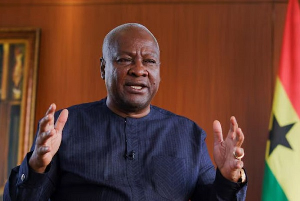 Mahama will take decisive action to bring the project back on track.
Mahama will take decisive action to bring the project back on track.
In his first State of the Nation Address to Parliament on February 27, 2025, in his second term, President John Dramani Mahama has reaffirmed his commitment to reviving the stalled Accra Marine Drive Project.
The project was a landmark urban redevelopment initiative aimed at transforming Accra’s coastline into a vibrant tourism and economic hub.
“We’re also committed to revitalising the Accra Marine Drive Project, a significant urban redevelopment initiative, which was designed to transform approximately 241 acres of Accra’s coastline into a vibrant tourism and economic hub,” he said.
Addressing Parliament, President Mahama expressed disappointment over the delays, stating, “Although Cabinet approval for this vital project was achieved during my presidency in 2016, progress has stalled.”
President Mahama announced plans to reassess the work completed so far and take decisive action to bring the project back on track.
“We will reassess the work completed and take decisive action to bring this all important project back on track,” he declared.
About the Accra Marine Drive Project
The Accra Marine Drive Project, conceived during President Mahama’s previous administration, was designed to redevelop approximately 241 acres of prime coastline in Accra.
The project, which received Cabinet approval in 2016, was envisioned as a world-class tourism, business, and recreational destination.
It was expected to feature luxury hotels, commercial spaces, recreational facilities, and cultural attractions, creating thousands of jobs and boosting Ghana’s tourism sector.
Despite its potential, the project has seen little progress since its inception.
The revival of the Accra Marine Drive Project is expected to have far-reaching benefits, including job creation, increased foreign investment, and enhanced tourism infrastructure.
The project aligns with the government’s broader vision of positioning Ghana as a leading destination for business and tourism in West Africa.
Background:
President Mahama’s SONA, which is in line with Article 67 of the 1992 Constitution, and which is expected to outline his ambitious “Resetting Ghana” agenda, aims at tackling economic challenges, creating jobs, and restoring stability.
In his address, the president is expected to touch on key areas of his government’s policy objectives.
He is also expected to provide updates on the state of Ghana’s economy, including the ongoing IMF bailout program, security, and the cost of living, among other issues.
Additionally, he will update Ghanaians on deliverables for the year ahead, as well as the achievements of his government so far and the challenges that lie ahead.
Watch the livestream below:
ID/AE
Click here to follow the GhanaWeb Entertainment News WhatsApp channel
2025 SONA: Quality education remains my priority
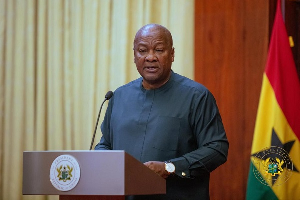 President John Dramani Mahama
President John Dramani Mahama
President John Dramani Mahama has reaffirmed his commitment to improving the quality of education in the country.
Delivering his maiden State of the Nation Address in his second term as president, in Parliament on Thursday, February 27, 2025, he noted that the current educational system, inherited from previous administrations, is outdated and must be realigned to meet the demands of the 21st century and the Fourth Industrial Revolution.
“The system we have inherited is outdated in many ways and must be realigned to meet the needs of the 21st century and the Fourth Industrial Revolution.
“We must provide meaningful and relevant education to prepare our youth for today’s technology-driven job market. Despite various reforms, issues related to low earning incomes persist within Ghana’s educational system. I am committed to ensuring that quality education remains a top priority,” he noted.
Recognising the urgent need for national dialogues on education and in the spirit of inclusive governance, President Mahama stated, “I launched the National Education Consultative Forum on February 18th in Ho. I look forward to the recommendations, which we will incorporate into our sectoral policy reforms.”
He also announced that Information and Communication Technology (ICT) training will be integrated into early childhood education at the basic level and also resource Islamic education.
“Over the next three years, this initiative will expand to cover at least 300 classrooms, 30 centers of excellence, and train 1,000 teachers and district teacher support teams, focusing on the teaching of mathematics and literacy.
“To further promote inclusion and equity, my government will enhance and resource the Islamic Education Unit to recruit more Islamic and Arabic tutors for English-Arabic schools,” he added.
He continued, “We will support Islamic colleges of education with infrastructure and logistics and enroll youth in Zongo and deprived urban communities in the National Apprentice Program to offer them free technical and vocational training.”
Background:
President Mahama’s address, which is in line with the Article 67 of the 1992 Constitution, and which is expected to outline his ambitious “Resetting Ghana” agenda, aims at tackling economic challenges, creating jobs, and restoring stability.
In his address, the president is expected to touch on key areas of his government’s policy objectives.
He is also expected to provide updates on the state of Ghana’s economy, including the ongoing IMF bailout program, security, and the cost of living, among other issues.
Additionally, he will update Ghanaians on deliverables for the year ahead, as well as the achievements of his government so far and the challenges that lie ahead.
JKB/AE
Watch as President Mahama delivers 7th State of the Nation Address
SONA 2025: NPP government left behind GH¢70 billion in energy sector debt
President John Dramani Mahama has expressed concern over the state of Ghana’s energy sector, emphasizing its high debt levels.
According to him, the sector is on the brink of collapse.
He noted that despite the Energy Sector Levy (ESLA) generating GH¢45 billion, the sector still faces a staggering GH¢70 billion in debt.
Delivering his first State of the Nation Address on February 27, 2025, President Mahama stated, “My administration inherited an energy sector on the brink of collapse. Despite collecting GH¢45 billion through the Energy Sector Levy (ESLA), the previous government left behind a GH¢70 billion debt in the energy sector.”
President Mahama’s address, delivered in accordance with Article 67 of the 1992 Constitution, is expected to outline his ambitious Resetting Ghana agenda, which focuses on tackling economic challenges, creating jobs, and restoring stability.
In his speech, the president is expected to highlight key policy objectives of his government.
He will also provide updates on the state of Ghana’s economy, including the ongoing IMF bailout program, security, and the cost of living, among other pressing issues.
Additionally, he will outline his administration’s deliverables for the year ahead, achievements so far, and the challenges that lie ahead.
SSD/MA
Watch the latest episode of Health Focus below
Sammy Kuffour spotted at Bayern Munich’s 125-year anniversary in Germany
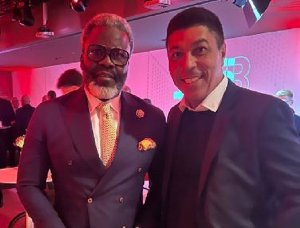 Sammy Kuffour and Giovani Elber
Sammy Kuffour and Giovani Elber
Legendary Ghanaian footballer Samuel Osei Kuffour was present at Bayern Munich’s 125th anniversary celebration on February 26, 2025.
The former Black Stars defender was dressed in a classy navy blue suit and cream trousers, gracing the occasion in grand style.
Kuffour took the opportunity to engage with some former teammates and officials of the club.
The event, held at Paulaner Nockherberg, had 650 distinguished guests, comprising personalities from politics, sports, and entertainment.
Sammy Kuffour’s stint with Bayern Munich
Kuffour spent 11 seasons with Bayern, rising from the youth teams to become a prominent first-squad member who lifted the UEFA Champions League with the club.
He was an integral part of the squad that won the 2000-01 Champions League, also scoring the winning goal in the 2001 Intercontinental Cup and being named man of the match.
Also that year, he finished second in Africa Footballer of the Year voting, repeating the feat he accomplished in 1999.
Kuffour made over 60 UEFA Champions League appearances, making him one of the most decorated African players of all time. After 12 seasons in Munich and 175 Bundesliga appearances, Kuffour left Bayern in 2005.
View Sammy Kuffour’s picture at the event below:
Sammy Kuffour at Bayern’s 125-year anniversary party this evening 🇬🇭
📸 @MartinVolkmar pic.twitter.com/KcYV5p32Ap
— Owuraku Ampofo (@_owurakuampofo) February 26, 2025
Meanwhile, Watch as Ghanaians tell Dede Ayew to retire from Black Stars to protect his legacy:
SB/EK
The ‘hero’ ship fixing Africa’s internet blackouts
A ship the size of a football field, crewed by more than 50 engineers and technicians, cruises the oceans around Africa to keep the continent online.
It provides a vital service, as last year’s internet blackout showed when internet cables buried deep under the sea were damaged.
Millions from Lagos to Nairobi were plunged into digital darkness: messaging apps crashed and banking transactions failed. It left businesses and individuals struggling.
It was the Léon Thévenin which fixed the multiple cable failures. The ship, where a BBC team recently spent a week on board off the coast of Ghana, has been doing this specialised repair work for the last 13 years
“Because of me, countries stay connected,” Shuru Arendse, a cable jointer from South Africa who has been working on the ship for more than a decade, tells the BBC.
“IT people at home have work because I bring the main feed in,” he says.
“You have heroes that save lives – I’m a hero because I save communication.”
His pride and passion reflect the sentiment of the skilled crew on the Léon Thévenin, which stands eight floors high and carries an assortment of equipment.
The internet is a network of computers servers – to read this article it is likely that at least one of 600 fibre optic cables across the world collected the data to present it on your screen.
Most of these servers are in data centres outside of Africa and the fibre optic cables run along the ocean floor linking them to coastal cities on the continent.
Data travels through hair-thin fibreglass wires, often grouped in pairs and protected by different layers of plastic and copper depending on how close the cables are to the shore.
“As long as the servers aren’t in the country, you need a connection. A cable runs from one country to the next, linking users to servers that store their data – whether it’s accessing Facebook or any other online service,” says Benjamin Smith, the Léon Thévenin’s deputy chief of mission.
Undersea fibre optic cables are designed to work for 25 years with minimal maintenance, but when they are damaged, it is usually due to human activity.
“The cable generally doesn’t break on its own unless you’re in an area where there are pretty high currents and very sharp rocks,” says Charles Heald, who is in charge of the ship’s remotely operated vehicle (ROV).
“But most of the time it’s people anchoring where they shouldn’t and fishing trawlers sometimes scrape along the seabed, so typically we would see scars from trawling.”
Mr Smith also says natural disasters cause damage to cables, especially in parts of the continent with extreme weather conditions. He gives an example of the seas off the coast of the Democratic Republic of Congo, where the Congo River empties into the Atlantic.
“In the Congo Canyon, where they have a lot of rainfall and low tide, it could create currents that damage the cable,” he says.
Deliberate sabotage is difficult to identify – but the Léon Thévenin crew say they not seen any obvious evidence of this themselves.
A year ago, three critical cables in the Red Sea – Seacom, AAE-1 and EIG – were severed, reportedly by a ship’s anchor, disrupting connectivity for millions across East Africa, including Kenya, Tanzania, Uganda and Mozambique.
Just a month later, in March 2024, a separate set of breaks in the Wacs, Ace, Sat-3, and MainOne cables off the coast of West Africa caused severe internet blackouts across Nigeria, Ghana, Ivory Coast and Liberia.
Anything that required the internet to function felt the strain as repairs stretched on for weeks.
Then in May, yet another setback: the Seacom and Eassy cables suffered damage off the coast of South Africa, hitting connectivity in multiple East African nations once again.
Such faults are detected by testing electricity and signal strength transmitted through cables.
“There may be 3,000 volts in a cable and suddenly it drops to 50 volts, this means there’s a problem,” explains Loic Wallerand, the ship’s chief of mission.
There are local teams with the capacity to deal with faults in shallow waters, but if they are detected beyond a depth of 50m (164ft), the ship is called into action. Its crew can fix cables deeper than 5,000m below sea level.
The repair witnessed by the BBC off Ghana took over a week to deal with, but most internet users did not notice as traffic was redirected to another cable.
The nature of every repair depends on the part of the cable that is damaged.
If the fibreglass at the core breaks, it means the data cannot travel along the network and needs to be sent to another cable.
But some African countries have only one cable serving them. This means a cable damaged this way leaves the affected area without the internet.
At other times, the protective layers of the fibre could be damaged, meaning data transmission still occurs, but with a lower efficiency. In both cases, the crew must find the exact location of the damage.
In the case of broken fibreglass, a light signal is sent through the cable and through its point of reflection, the crew can determine where the break is.
When the problem is with the cable’s insulation – known as a “shunt fault” – it becomes more complicated and an electrical signal has to be sent along the cable to physically track where it is lost.
After narrowing down the possible area for the fault, the operation moves to the ROV team.
Built like a bulldozer, the ROV, weighing 9.5 tonnes, is lowered under water from the ship where it is guided down to the ocean floor.
About five crew members work with a crane operator to deploy it – once it is released from its harness, called the umbilical cord, it floats gracefully.
“It doesn’t sink,” says Mr Heald, explaining how it uses four horizontal and vertical thrusters to move in any direction.
The ROV’s
three cameras allow the team onboard to look for the precise location of faults as it moves to the ocean bed.
Once found, the ROV cuts the affected part using its two arms, then ties it to a rope that is dragged back to the ship.
Here the faulty section is isolated and replaced by splicing and joining it to a new cable – a process that looks like welding and which took 24 hours in the case of the operation witnessed by the BBC.
Afterwards the cable was carefully lowered back to the ocean bed and then the ROV made one final journey to inspect that it was well placed and take coordinates so maps could be updated.
When an alert is received about a damaged cable, the Léon Thévenin crew is ready to sail within 24 hours. However, their response time depends on several factors: the ship’s location, the availability of spare cables and bureaucratic challenges.
“Permits can take weeks. Sometimes we sail to the affected country and wait offshore until the paperwork is sorted,” Mr Wallerand says.
On the average, the crew spends more than six months at sea every year.
“It’s part of the job,” says Captain Thomas Quehec.
But talking to the crew members between tasks, it is hard to ignore their personal sacrifices.
They are drawn from different backgrounds and nationalities: French, South African, Filipino, Malagasy and more.
Adrian Morgan, the ship’s chief steward from South Africa, has missed five consecutive wedding anniversaries.
“I wanted to quit. It was difficult to stay away from my family, but my wife encouraged me. I do it for them,” he says.
Another South African, maintenance fitter Noel Goeieman, is worried he may miss his son’s wedding in a few weeks if the ship is called out to another mission.
“I’ve heard we might go to Durban [in South Africa]. My son is going to be very sad because he doesn’t have a mum,” says Mr Goeieman, who lost his wife three years ago.
“But I’m retiring in six months,” he adds with a smile.
Despite the emotional toll, there is camaraderie onboard.
When off-duty, crew members are either playing video games in the lounge or sharing meals in the ship’s mess hall.
Their entry into the profession is as diverse as their background.
While Mr Goeieman followed his father’s footsteps, chief cook, South African Remario Smith, went to sea to escape a life of crime.
“I was involved in gangs when I was younger,” Mr Smith says, “My child was born when I turned 25, and I knew I had to change my life.”
Like the others onboard he is appreciative of the role the ship plays on the continent.
“We are the link between Africa and the world,” says chief engineer Ferron Hartzenberg.
Tragic! Beautiful female KNUST student unalived on campus
A beautiful female KNUST student named Joana has been found dead near the school’s disability centre.
As alleged, Joana was attacked by armed robbers while she was on her way to the hostel after studying last night.
Reports also indicate that she was stabbed by the assailants who later absconded with her phone and money after committing the heinous crime.
Patrick Boamah in, Afenyo-Markin out – NPP supporter calls for change in minority leadership
A staunch supporter of the opposition New Patriotic Party (NPP) has called for the removal of Alexander Afenyo-Markin as minority leader.
According to him, Afenyo-Markin’s behavior on the Appointments Committee is unbecoming of a leader, hence the call.
The NPP supporter identified as Oh Menua took to X to make this call, describing Patrick Boamah as a better and refined person to lead the minority in parliament.
Chic Bubu Styles For The Modern Fashionable Woman
Chic Bubu Styles For The Modern Fashionable Woman
News Hub Creator24min
Chic Bubu styles have become a staple for the modern fashionable woman due to their effortless blend of elegance and comfort. These flowing garments are designed to offer a sophisticated yet relaxed look, making them ideal for various occasions. Their appeal lies in their versatility, as they can be styled for both casual outings and glamorous events. The loose-fitting nature of Bubu styles provides maximum comfort, allowing women to move freely while maintaining a regal presence. This makes them suitable for all body types, as they gracefully drape over the frame without clinging too tightly.
Fashion designers continuously introduce contemporary elements to Bubu designs, ensuring they remain trendy and appealing. Embellishments such as intricate embroidery, beadwork, and lace details enhance the overall aesthetic, making them stand out. The use of high-quality fabrics like silk, chiffon, and organza elevates their luxurious appeal, adding a touch of refinement to the outfit. Vibrant colors and unique patterns further contribute to their charm, allowing women to express their individuality through fashion. The simplicity of the silhouette makes accessorizing easy, as statement jewelry, stylish handbags, and elegant footwear can effortlessly complete the look.
Modern Bubu styles also cater to diverse fashion preferences, as designers incorporate elements like asymmetrical cuts, dramatic sleeves, and layered designs. These creative variations ensure that women can experiment with
MUSIGA To Hold Health Screening, Seminar
Abena Ruthy
As part of activities put in place to celebrate this year’s edition of the annual Ghana Month, the Musicians Union of Ghana (MUSIGA) will host a free health screening exercise and music business seminar for its members on March 13.
According to MUSIGA President, Bessa Simons, the two events will be held at the Accra Tourist Information Centre (ATIC) and both events are anticipated to draw hundreds of musicians.
Participants of the health screening exercise will receive general consultations, blood pressure checks, dental and eye examinations, and malaria tests from the free health screening team.
Additionally, free medical counseling will also be provided to participants at the health screening exercise.
In addition to the free health screening, MUSIGA will host a music seminar same day to encourage its members to use online platforms to promote their varied musical compositions.
Participants will have a platform to understand and seize opportunities in global emerging markets.
The seminar aligns with MUSIGA’s mission to help Ghanaian musicians learn the fundamentals of music, so they can take on the challenges that lie ahead.
The seminar’s primary goals are to promote Ghanaian music internationally and provide a forum for up-and-coming musicians to discuss the direction of the music business.
It will help the artistes to adopt strategies that will aid them to push Ghanaian music to the global market.
Some of Ghana’s most seasoned musicians will be featured, sharing their thoughts, values, and life lessons gained from their time in the industry.
The seminar’s speakers will guide conversations to look at copyright and intellectual property issues in the creative arts community.
By George Clifford Owusu
I, John Dramani Mahama, I will fix the economic crisis facing the country
President John Dramani Mahama has issued a firm assurance to the nation of his full commitment to tackling the economic challenges currently facing Ghana.
Delivering his first State of the Nation Address in his second term to Parliament on Thursday, 27th February, President Mahama acknowledged the severe economic challenges facing the nation but vowed to put Ghana back on a path of growth and prosperity.
In his address, President Mahama emphasised that it was not his style to lament or shift blame in the face of adversity. “It is not my style to lament and shift blame because of challenges. My approach is to accept challenges and work hard to resolve them,” he stated.
He also made it clear that the people of Ghana did not elect him to complain about the state of the country, despite the many issues at hand.
“Indeed, this is why the people of Ghana elected me—to solve Ghana’s problems. I am not here to lament about the state of our country, though there is much to lament about,” Mahama said, reiterating his focus on finding solutions, he said
The President reflected on the trust the people had placed in him during his previous tenure, noting, “I understand why I was elected with such high voter confidence, and that is to solve Ghana’s problems.”
He also took a moment to highlight one of his key accomplishments from his previous term in the resolution of the power crisis, commonly referred to as “dumsor.”
“I stood here to declare my determination to fix ‘dumsor,’ a legacy problem of power shortages. I promised to fix it, and I did,” he affirmed. “I wish to place firmly on record that from January 2016 until I handed over the administration of this country on 7th January 2017, there was no power shortage.”
Looking ahead, he made a bold declaration for the future: “Today, inspired by the Almighty God, and propelled by the massive mandate given to me by the people of Ghana, I am moved to make a similar, purposeful, and bold declaration: I, John Dramani Mahama, will fix the economic crisis confronting the country and reset it on the path of growth and prosperity.”
He assured the nation that his government, in collaboration with all Ghanaians, would tackle these challenges head-on. “We have developed a plan with the support of our people,” he said. “Together, we will overcome the obstacles and set the nation on a path of sustainable development and progress.”
DISCLAIMER: The Views, Comments, Opinions, Contributions and Statements made by Readers and Contributors on this platform do not necessarily represent the views or policy of Multimedia Group Limited.


